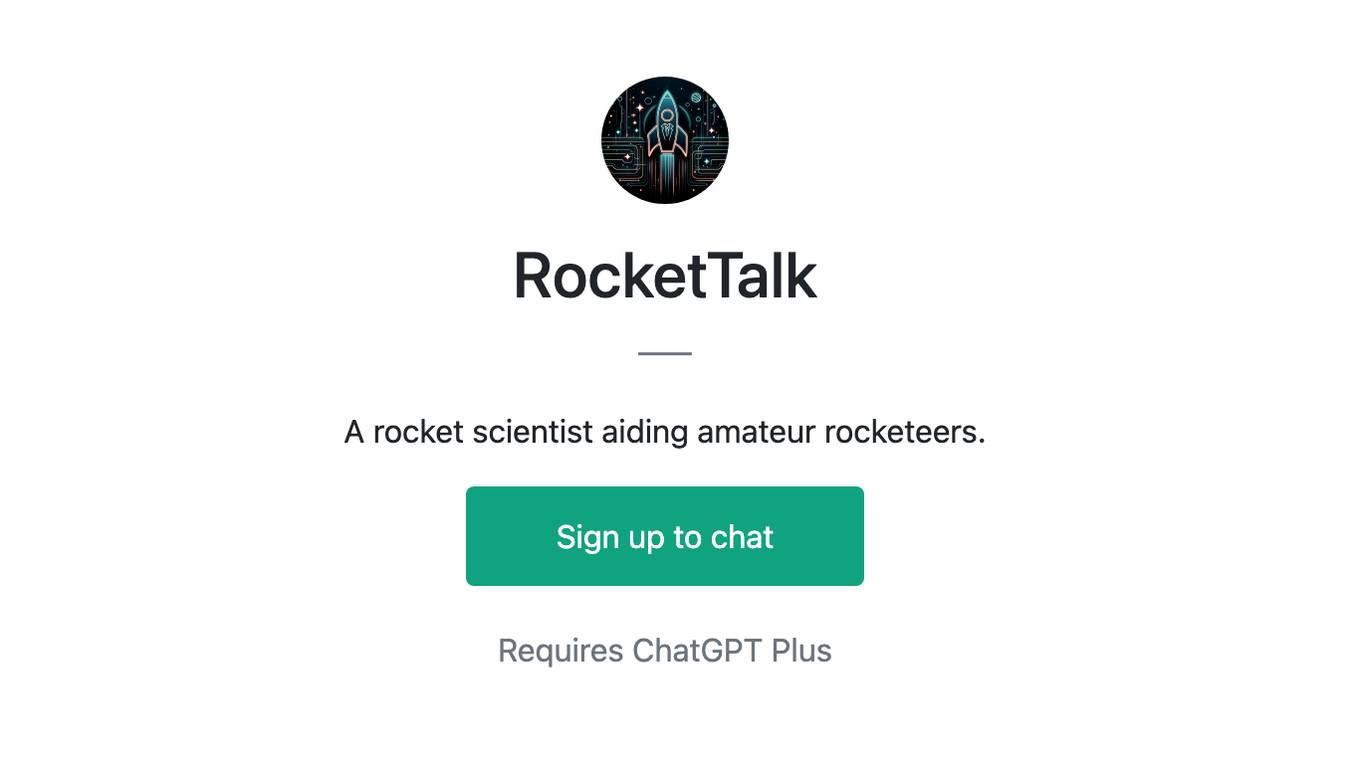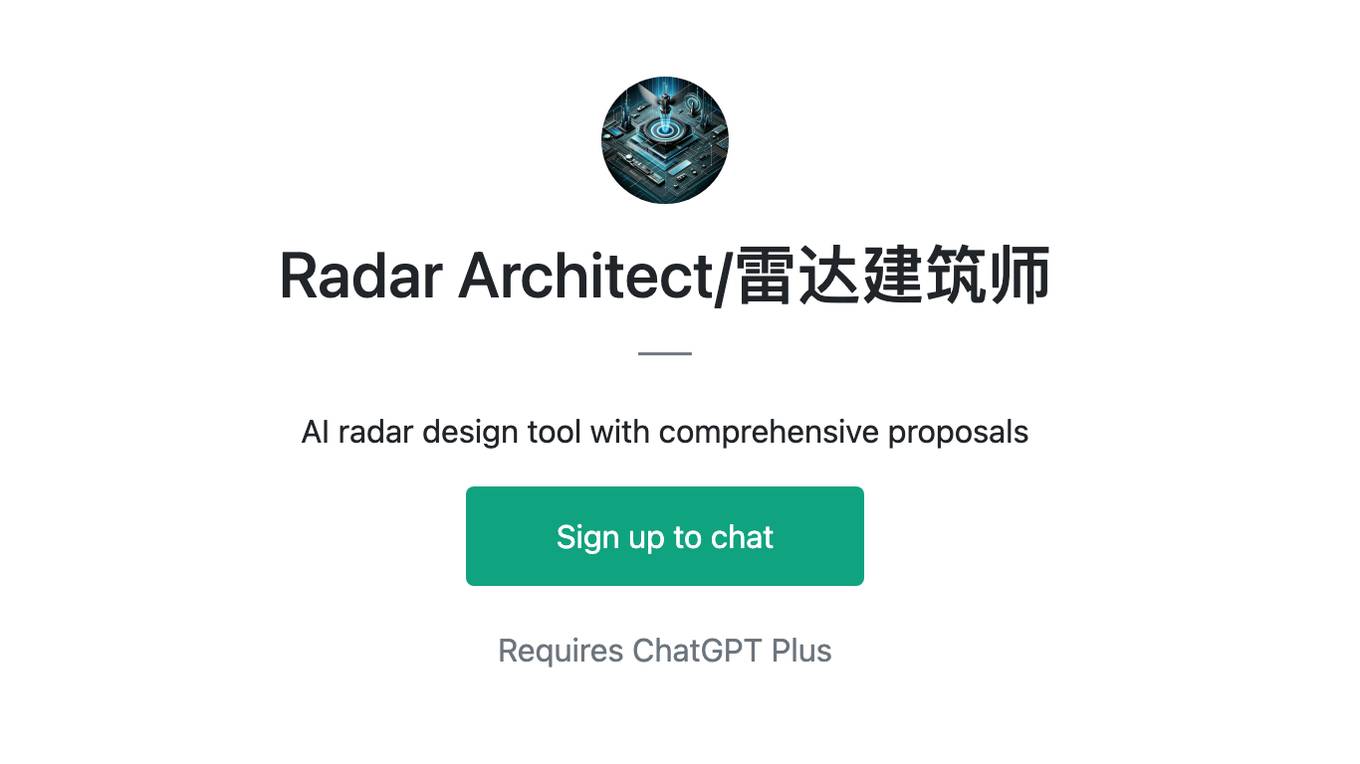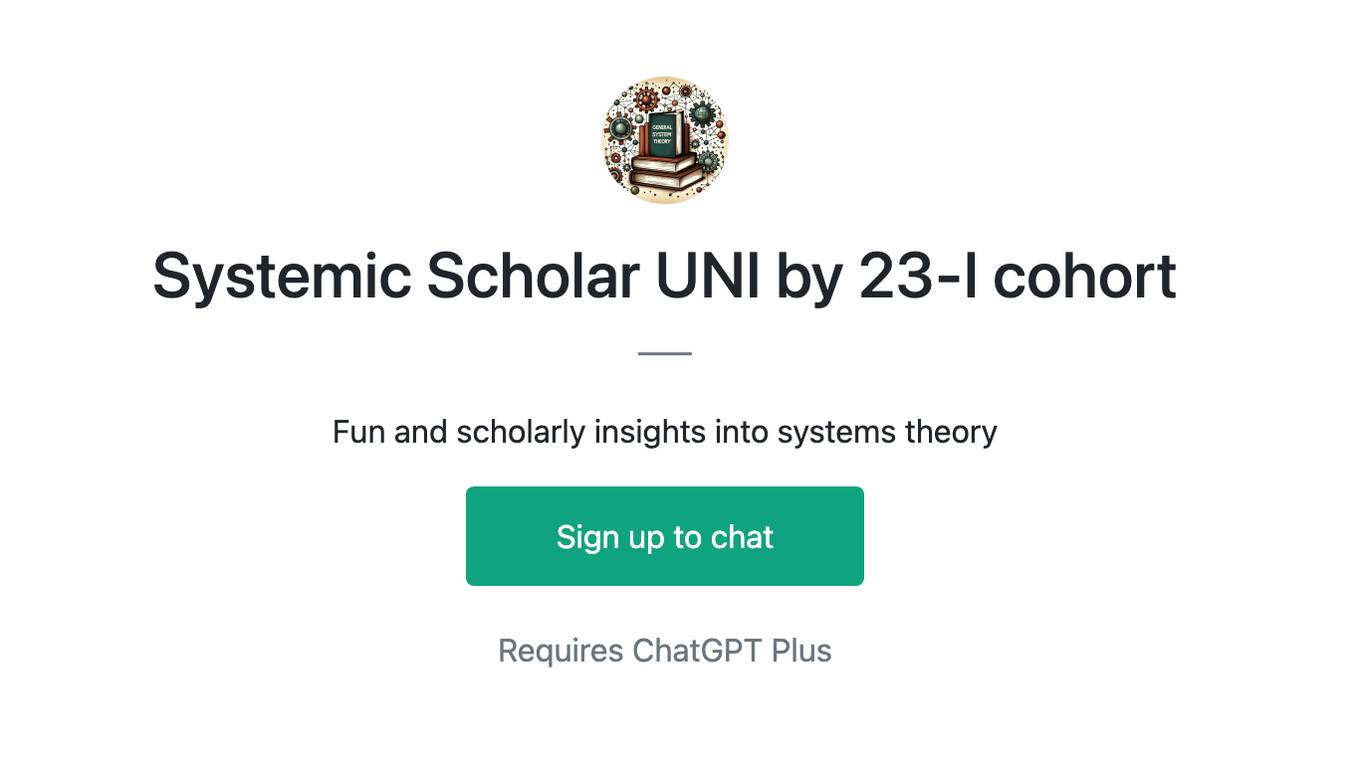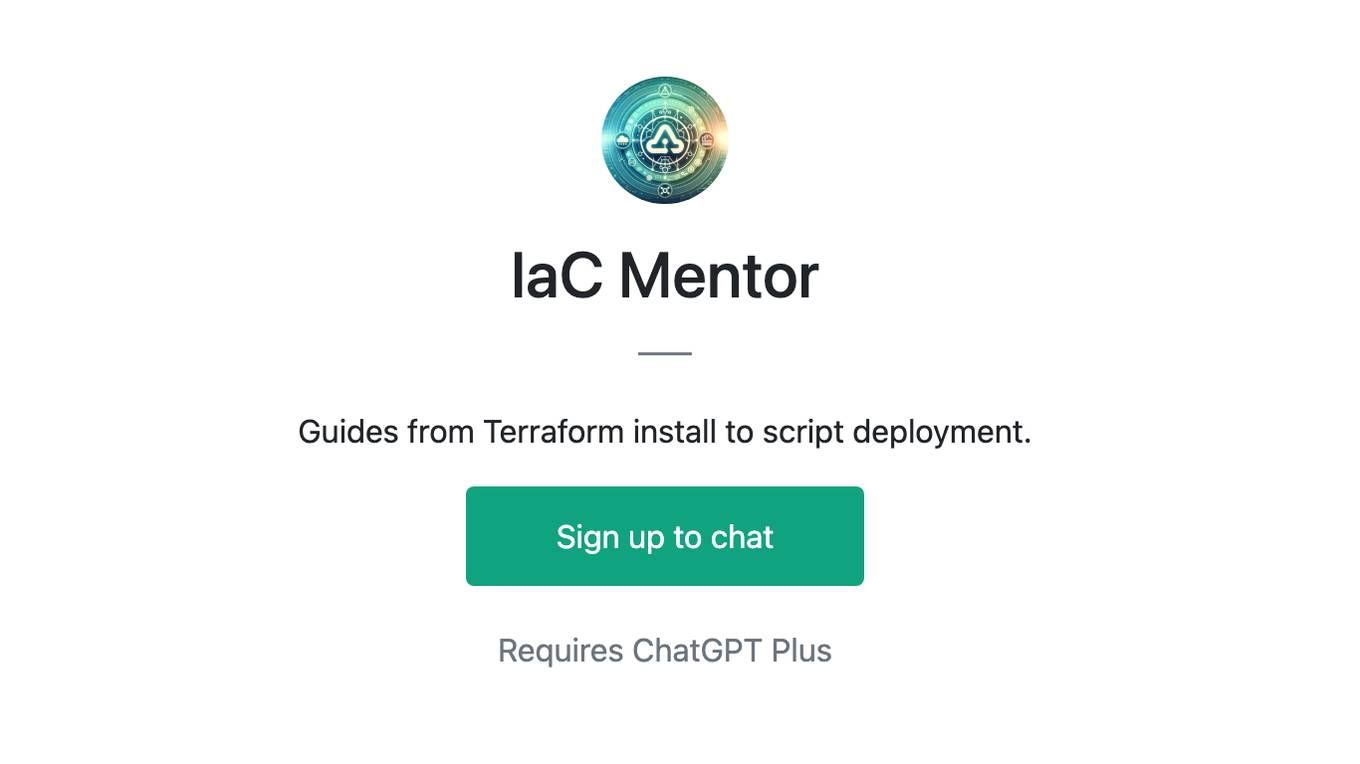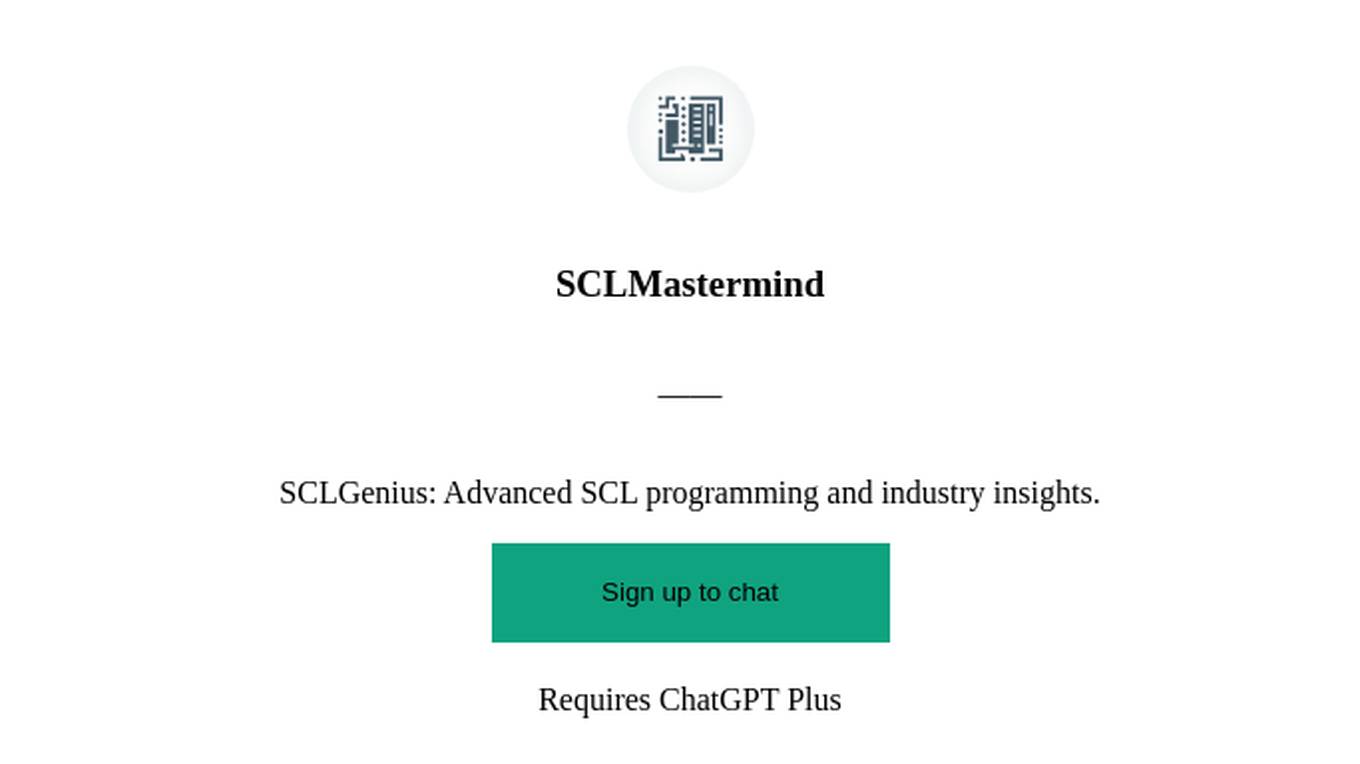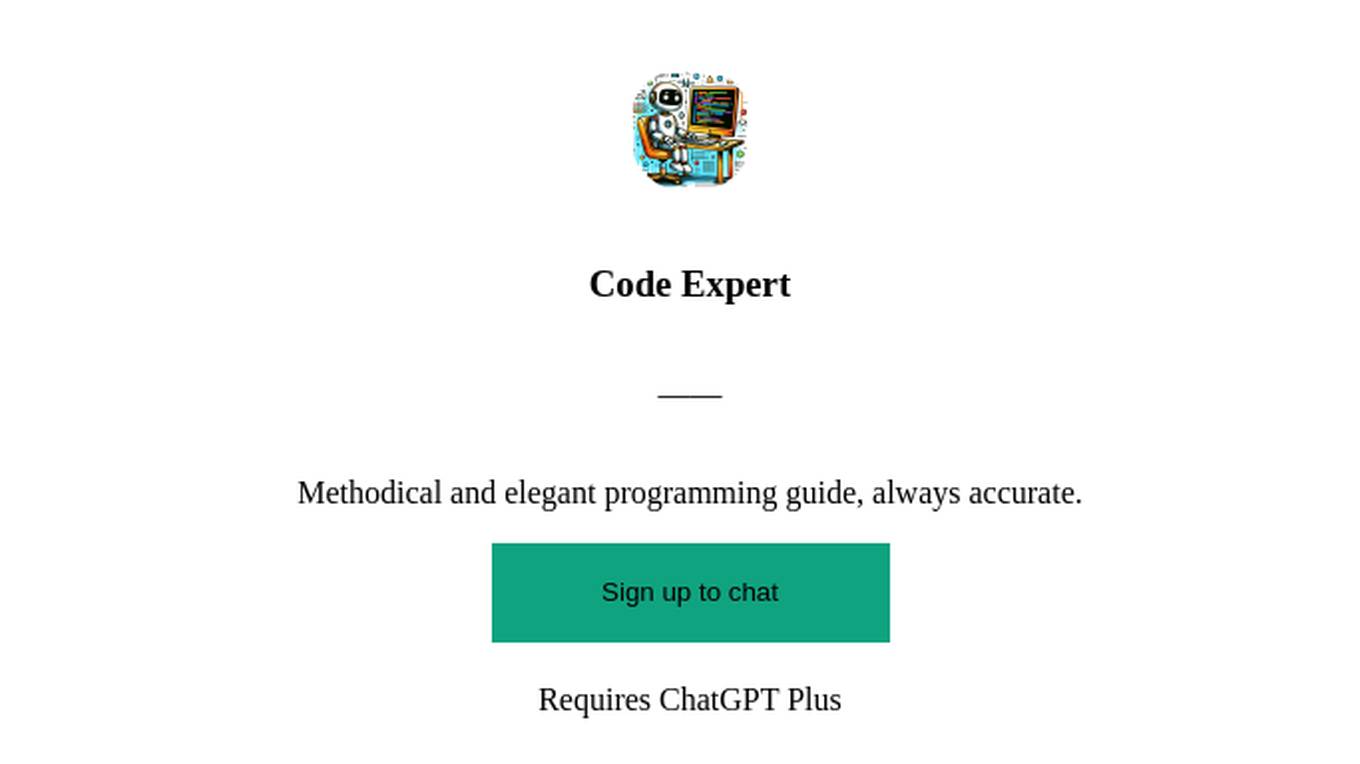Best AI tools for< Systems Engineer >
Infographic
10 - AI tool Sites
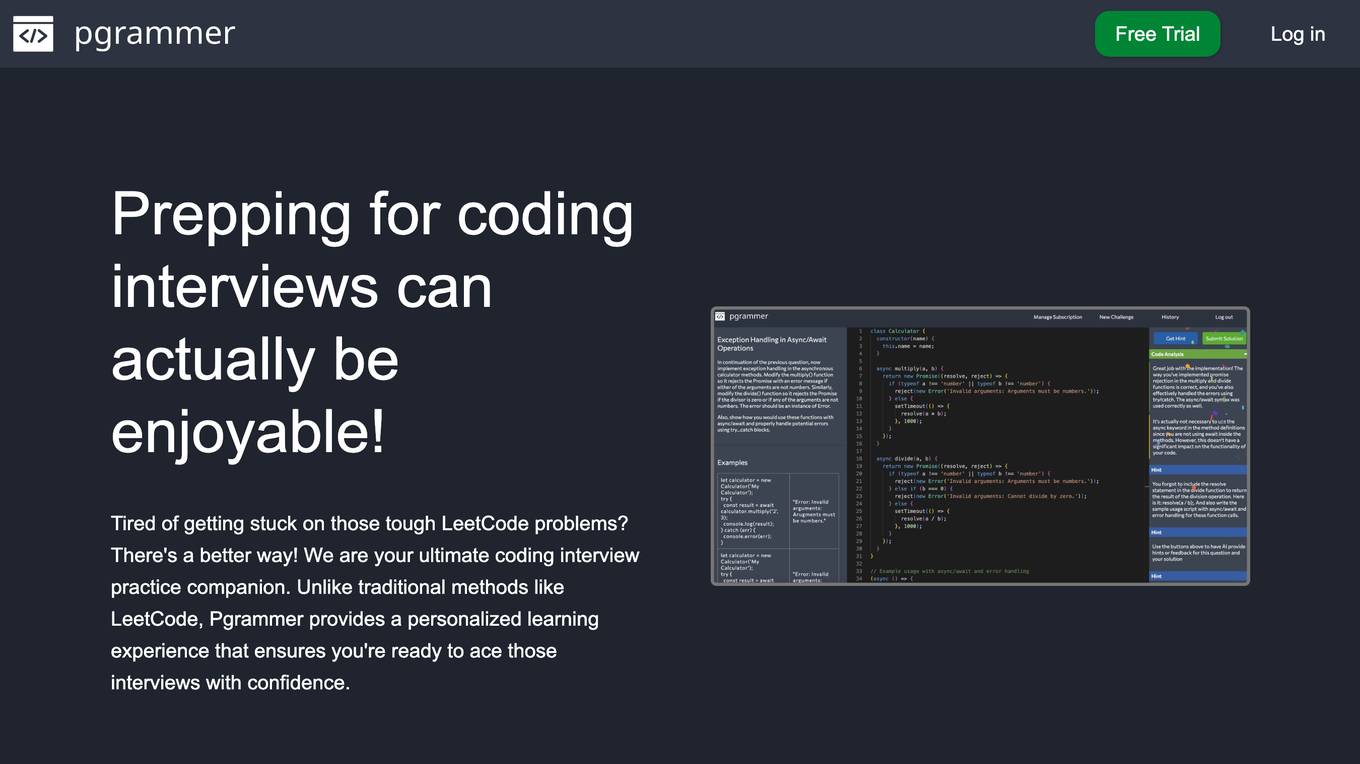
Pgrammer
Pgrammer is an AI-powered platform designed to help users practice coding interview questions with hints and personalized learning experiences. Unlike traditional methods like LeetCode, Pgrammer offers a diverse set of questions for over 20 programming languages, real-time hints, and solution analysis to improve coding skills and knowledge. The platform uses AI, specifically GPT-4, to determine question difficulty levels and provide feedback on code submissions. Pgrammer aims to make coding interview preparation enjoyable and effective for both beginners and seasoned professionals.

Eventual
Eventual is an AI application that revolutionizes data processing by building a generational technology for multimodal data. Their query engine, Daft, simplifies processing of images, video, audio, and text, enabling engineers to work on breakthrough AI systems without the need to be distributed systems experts. Eventual's infrastructure processes petabytes of data daily for companies like Amazon and MobilEye, paving the way for a multimodal future built on solid foundations.
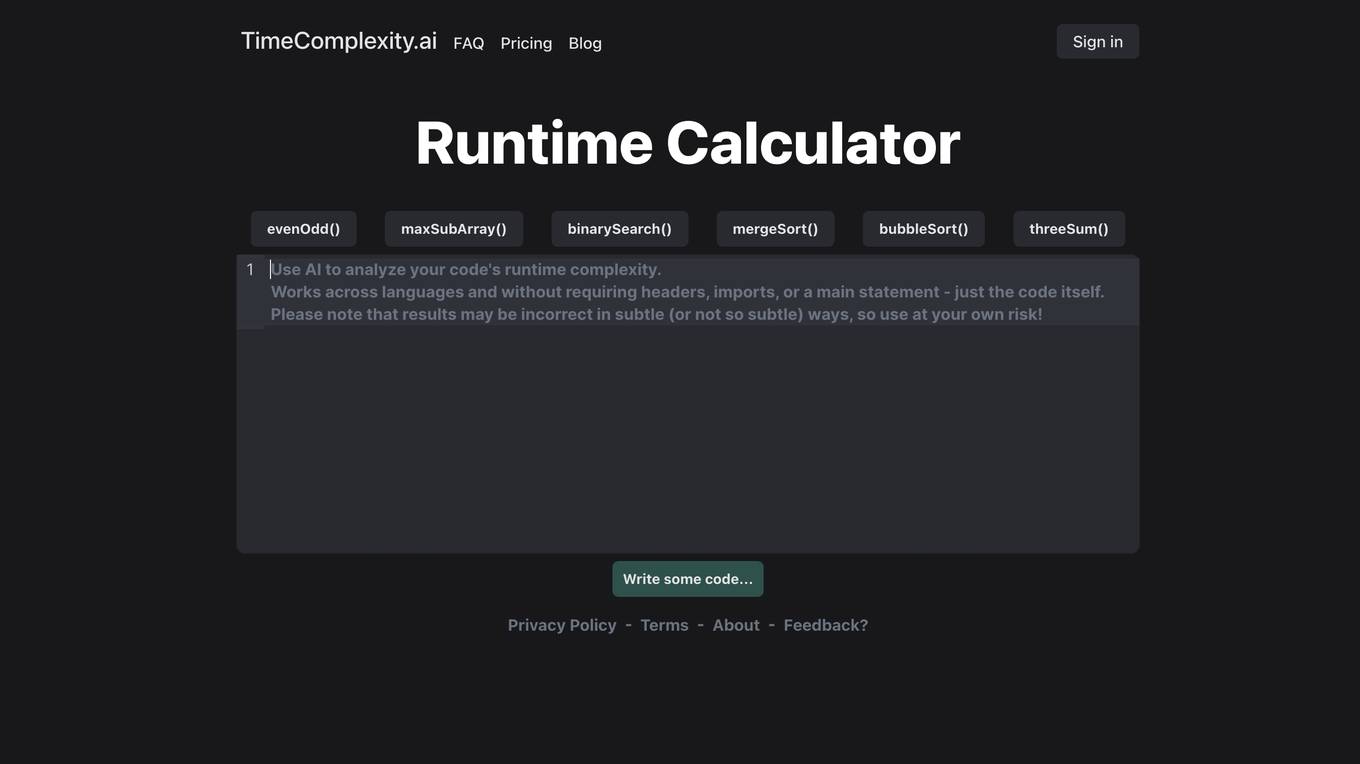
TimeComplexity.ai
TimeComplexity.ai is an AI tool that helps users analyze the runtime complexity of their code. It can be used across different programming languages without the need for headers, imports, or a main statement. Users can input their code and get insights into its time complexity. However, it is important to note that the results may not always be accurate, so caution is advised when using the tool.
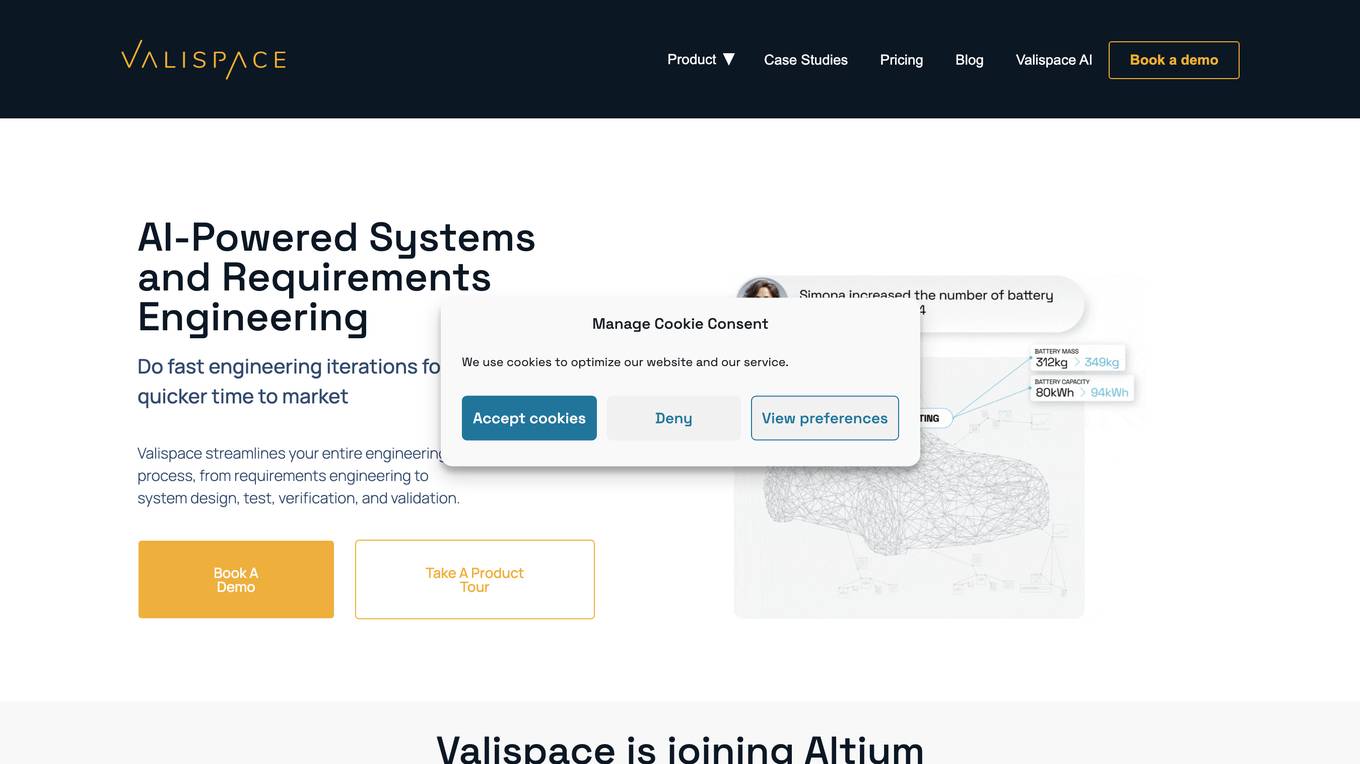
Valispace
Valispace is an AI-powered platform that streamlines the entire engineering process, from requirements engineering to system design, test, verification, and validation. It modernizes classic engineering practices, enabling fast design iterations and automatic verifications. The platform assists in removing mundane and manual engineering tasks, saving engineering hours and enhancing collaboration among engineers and stakeholders.
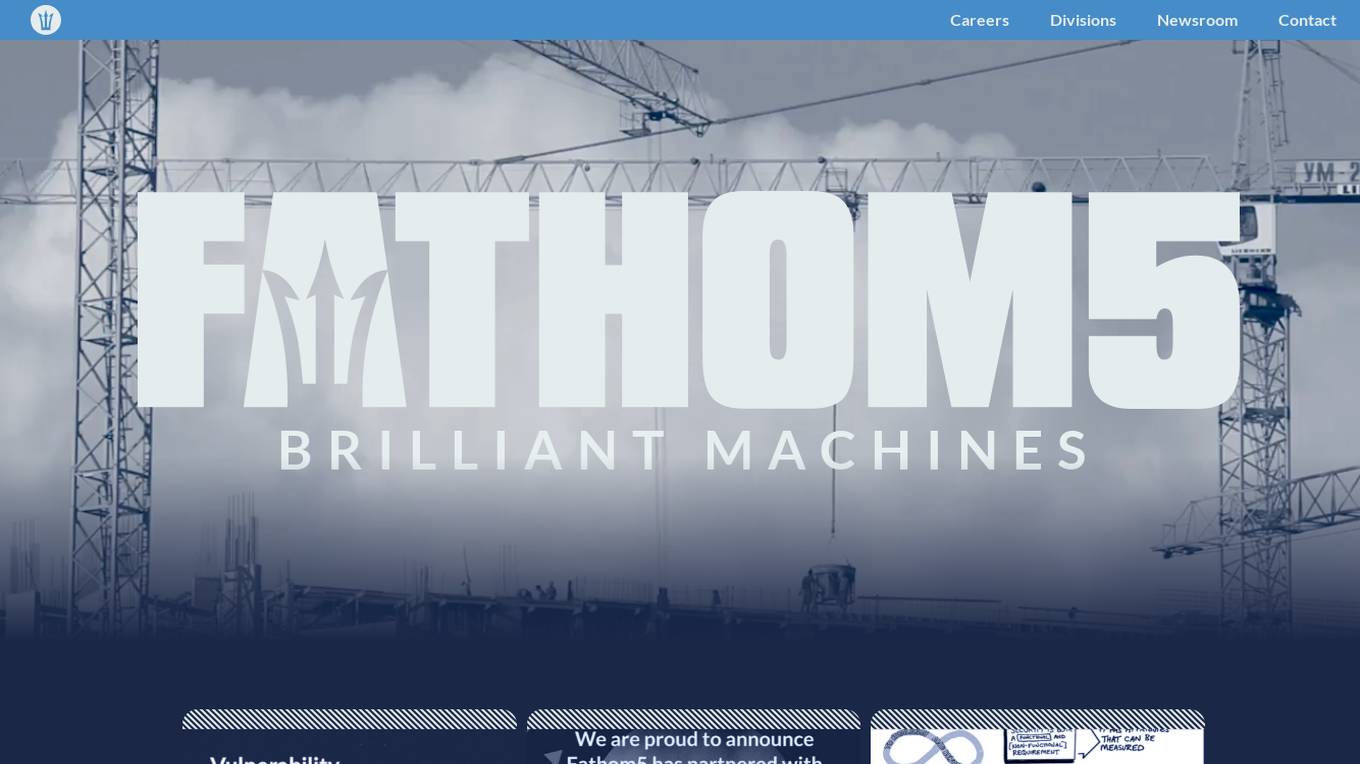
Fathom5
Fathom5 is a company that specializes in the intersection of AI and industrial systems. They offer a range of products and services to help customers build more resilient, flexible, and efficient industrial systems. Fathom5's approach is unique in that they take a security-first approach to cyber-physical system design. This means that security is built into every stage of the development process, from ideation to engineering to testing to deployment. This approach has been proven to achieve higher system resiliency and faster regulatory compliance at a reduced cost.

Anduril
Anduril is a defense technology company that develops autonomous systems for land, sea, and air. The company's products are powered by Lattice OS, an AI-powered operating system that brings autonomy to defense's toughest missions. Anduril's systems are designed to provide integrated, persistent awareness and security across all domains, enabling warfighters to make better decisions and respond more quickly to threats.
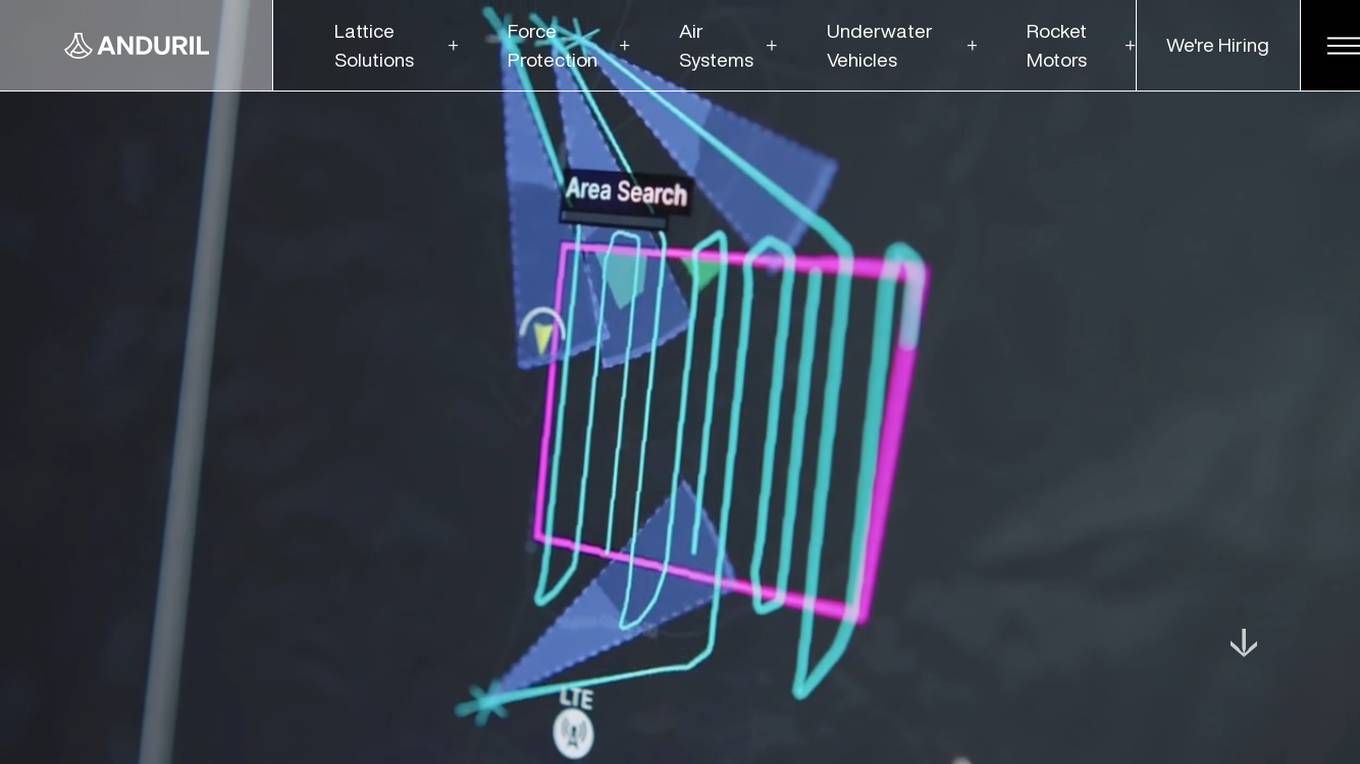
Anduril Industries
Anduril Industries is a defense technology company that develops autonomous systems for land, sea, and air. The company's products include the Lattice operating system, which powers a family of autonomous systems that provide integrated, persistent awareness and security. Anduril also develops counter-UAS, counter-intrusion, and maritime counter-intrusion systems. The company's mission is to transform defense capabilities with advanced technology.
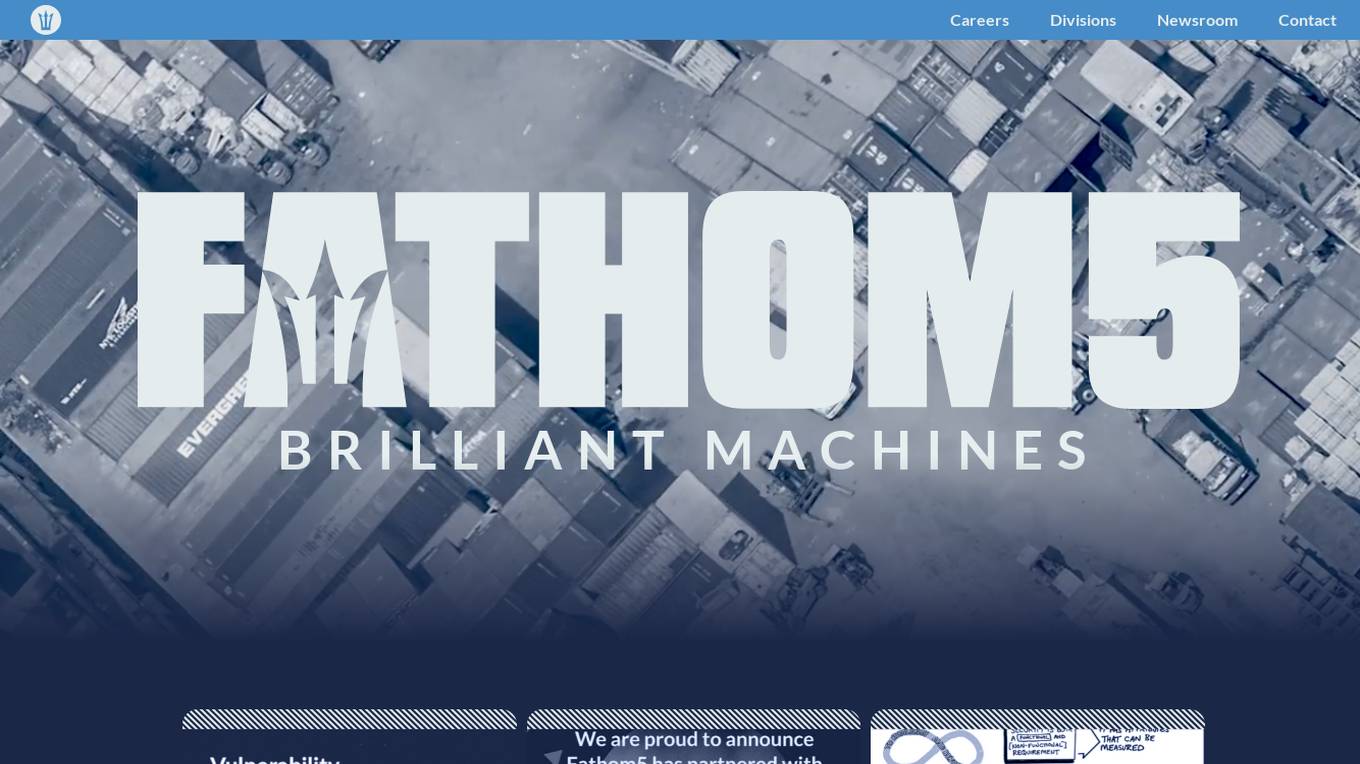
Fathom5
Fathom5 is a company that specializes in the intersection of AI and industrial systems. They offer a range of products and services to help customers build the industrial systems of the future. Their solutions are focused on critical infrastructure, making it more resilient, flexible, and efficient.

Nuro
Nuro is an autonomous technology company focused on revolutionizing mobility through robotics and AI. They offer cutting-edge AI-first autonomy solutions for automotive and mobility applications, including robotaxis and autonomous vehicles. Nuro's state-of-the-art AV technology, Nuro Driver™, is designed to drive safely and naturally on all roads using groundbreaking AI-first autonomy. The company prioritizes safety in all aspects of its operations, from hardware and software to testing and systems engineering. With 8 years of autonomy innovation, Nuro aims to transform the way goods and people move by empowering fleets with AI-first autonomous capabilities.
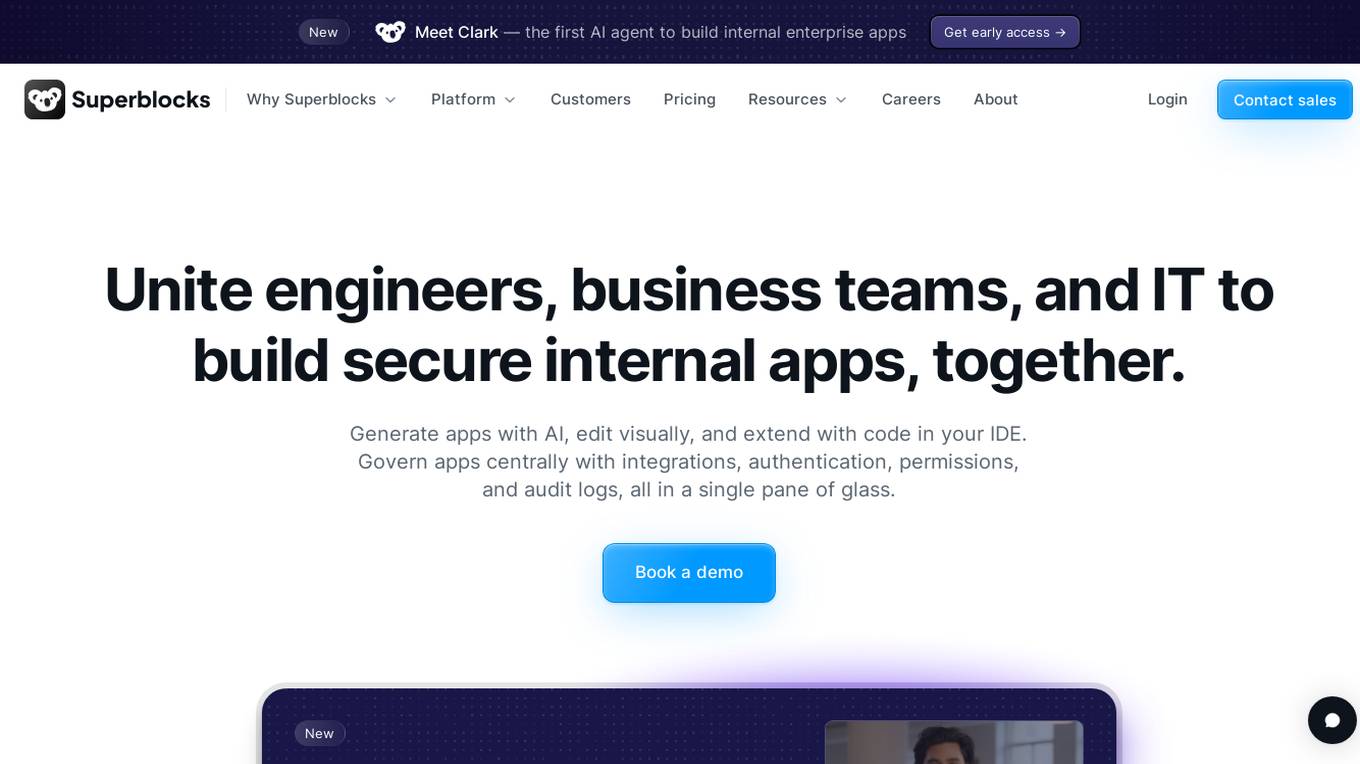
Superblocks
Superblocks is an AI-powered platform that unites engineers, business teams, and IT professionals to collaboratively build secure internal applications. The platform offers features such as generating apps with AI, visual editing, extending with code, centralized governance, integrations, authentication, permissions, and audit logs. Superblocks aims to enable enterprises to accelerate app development, streamline workflows, and ensure data security within their VPC.
29 - Open Source Tools
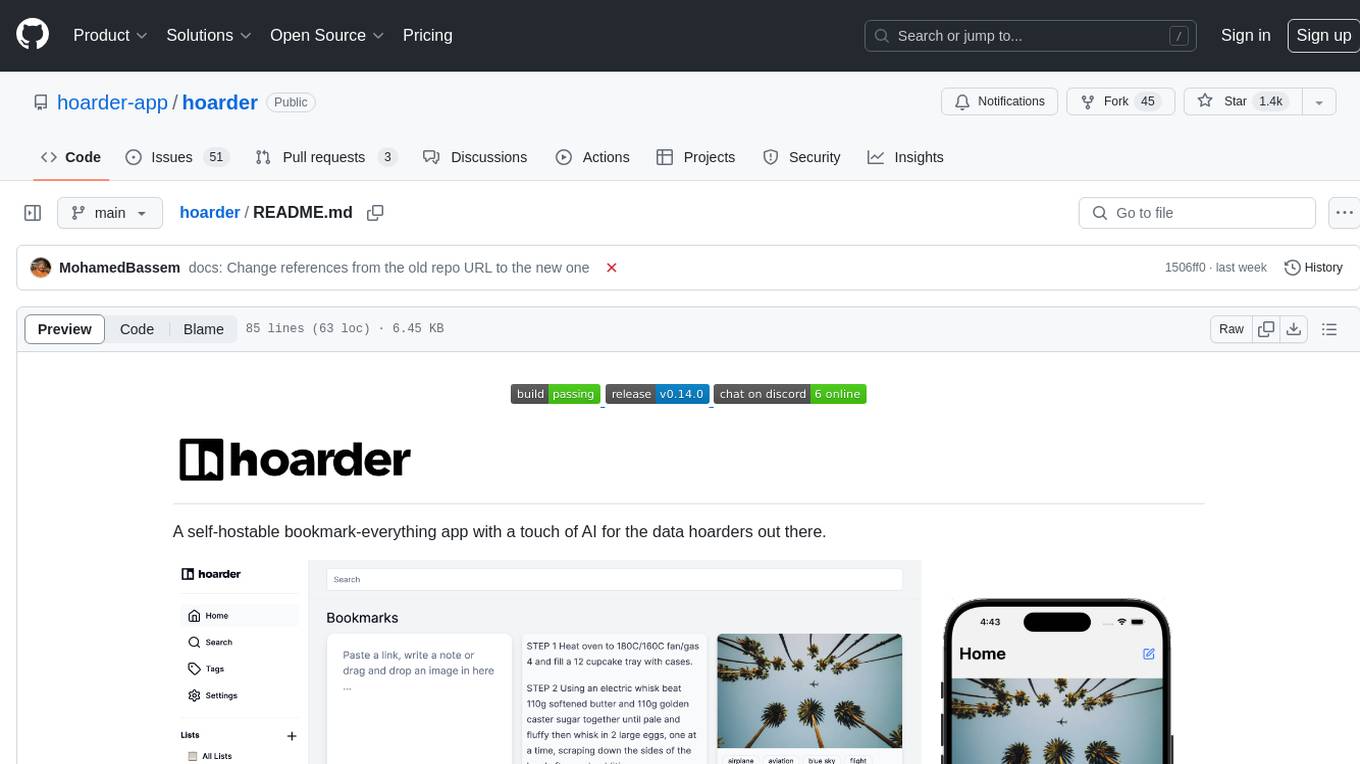
hoarder
A self-hostable bookmark-everything app with a touch of AI for data hoarders. Features include bookmarking links, taking notes, storing images, automatic fetching for link details, full-text search, AI-based automatic tagging, Chrome and Firefox plugins, iOS and Android apps, dark mode support, and self-hosting. Built to address the need for archiving and previewing links with automatic tagging. Developed by a systems engineer to stay connected with web development and cater to personal use cases.
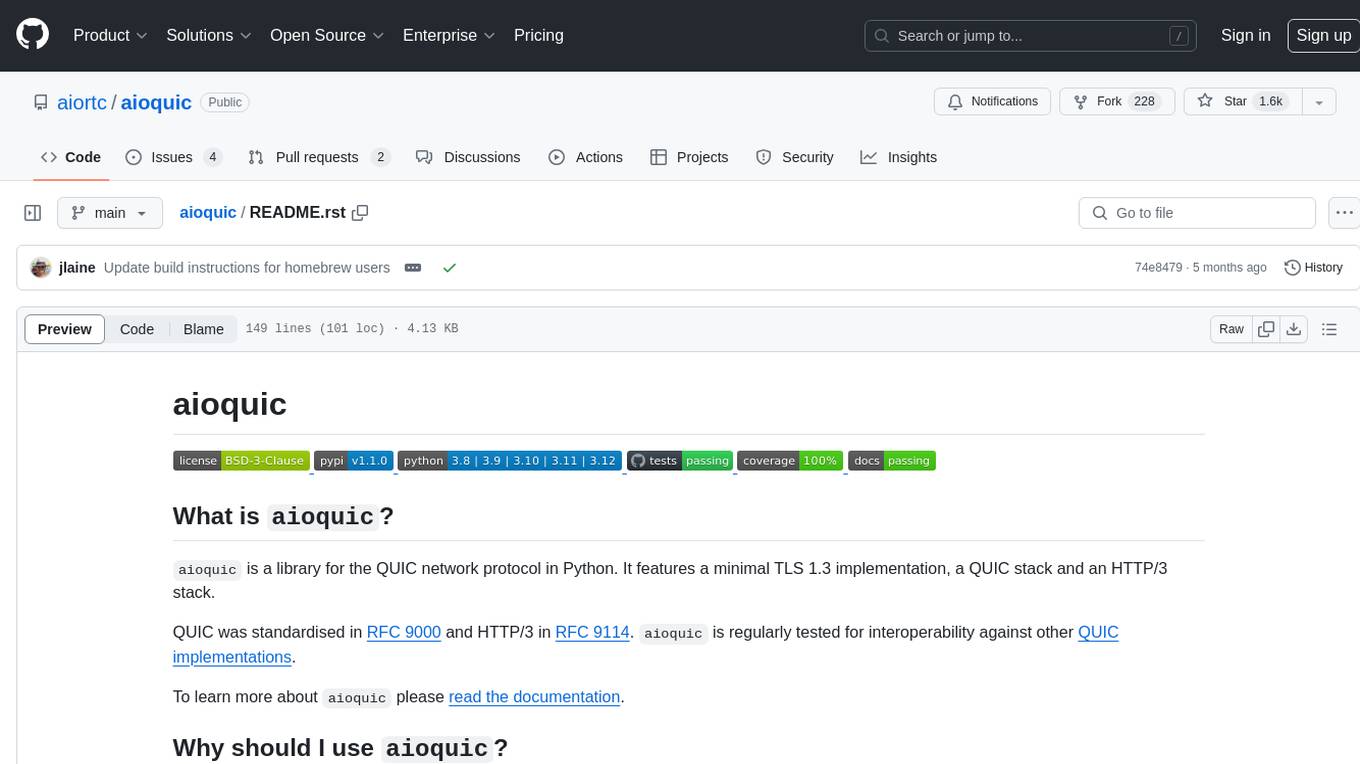
aioquic
aioquic is a Python library for the QUIC network protocol, featuring a minimal TLS 1.3 implementation, a QUIC stack, and an HTTP/3 stack. It is designed to be embedded into Python client and server libraries supporting QUIC and HTTP/3, with IPv4 and IPv6 support, connection migration, NAT rebinding, logging TLS traffic secrets and QUIC events, server push, WebSocket bootstrapping, and datagram support. The library follows the 'bring your own I/O' pattern for QUIC and HTTP/3 APIs, making it testable and integrable with different concurrency models.
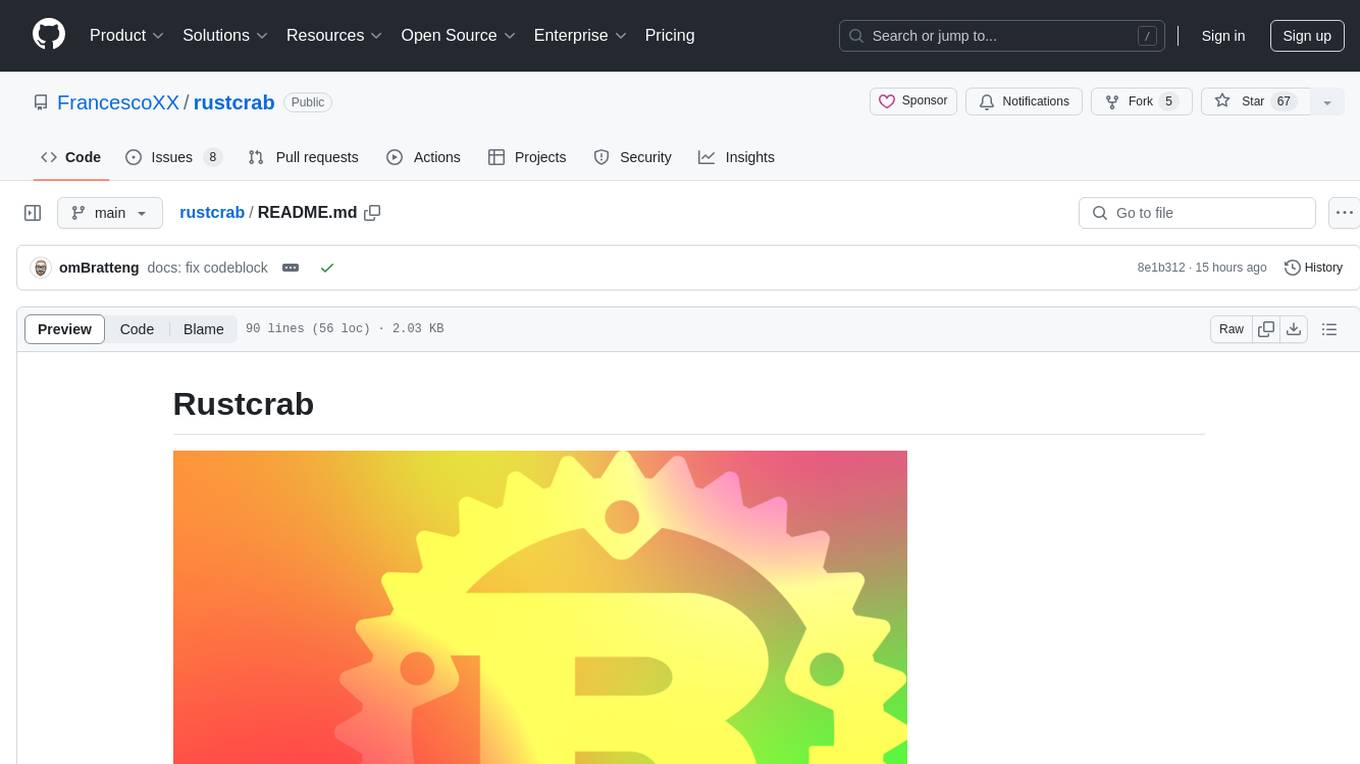
rustcrab
Rustcrab is a repository for Rust developers, offering resources, tools, and guides to enhance Rust programming skills. It is a Next.js application with Tailwind CSS and TypeScript, featuring real-time display of GitHub stars, light/dark mode toggling, integration with daily.dev, and social media links. Users can clone the repository, install dependencies, run the development server, build for production, and deploy to various platforms. Contributions are encouraged through opening issues or submitting pull requests.
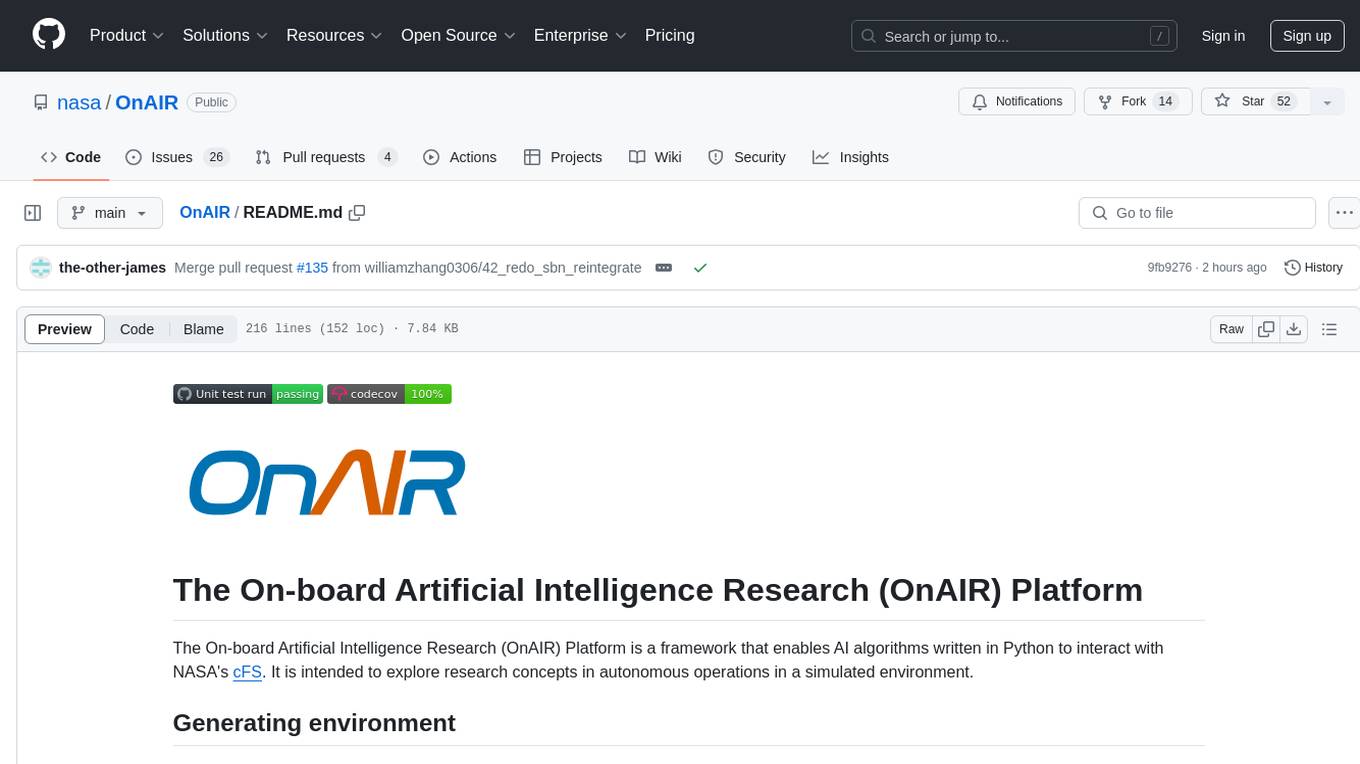
OnAIR
The On-board Artificial Intelligence Research (OnAIR) Platform is a framework that enables AI algorithms written in Python to interact with NASA's cFS. It is intended to explore research concepts in autonomous operations in a simulated environment. The platform provides tools for generating environments, handling telemetry data through Redis, running unit tests, and contributing to the repository. Users can set up a conda environment, configure telemetry and Redis examples, run simulations, and conduct unit tests to ensure the functionality of their AI algorithms. The platform also includes guidelines for licensing, copyright, and contributions to the repository.
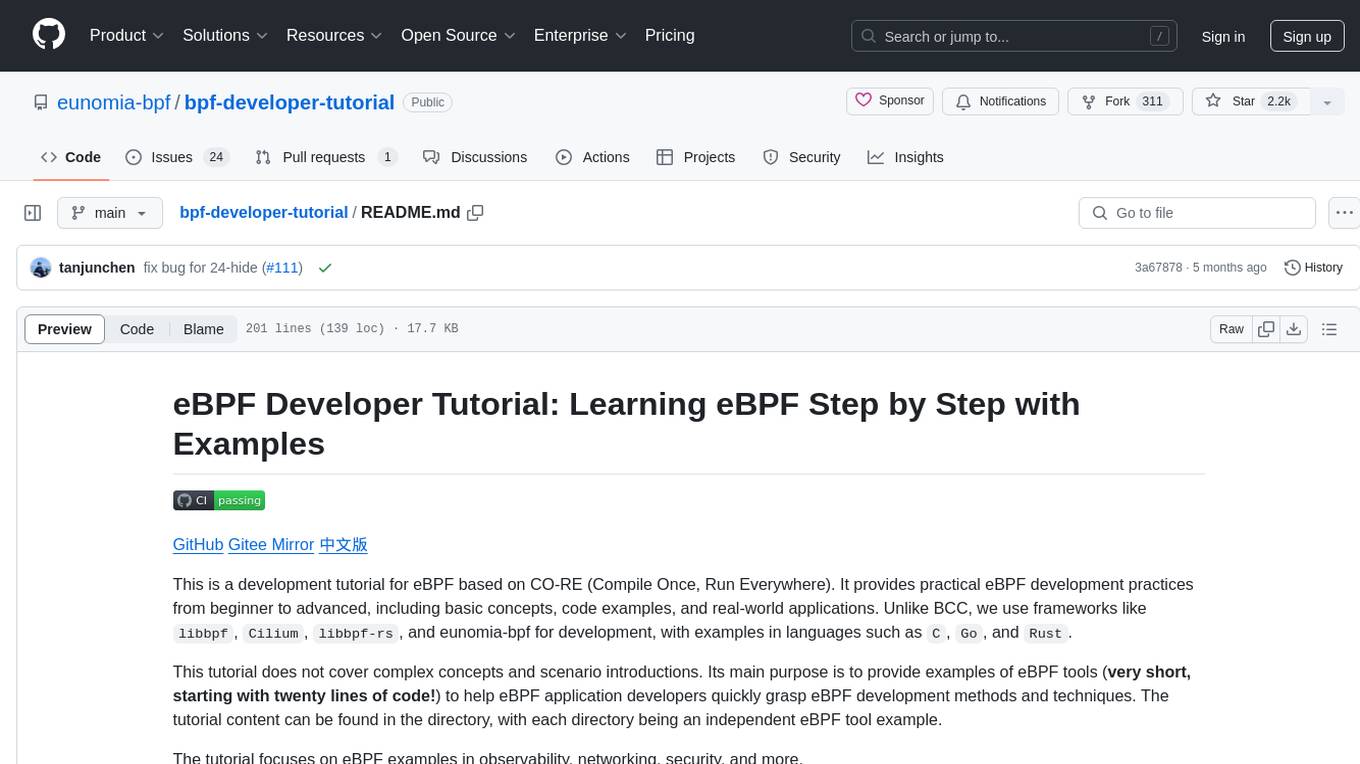
bpf-developer-tutorial
This is a development tutorial for eBPF based on CO-RE (Compile Once, Run Everywhere). It provides practical eBPF development practices from beginner to advanced, including basic concepts, code examples, and real-world applications. The tutorial focuses on eBPF examples in observability, networking, security, and more. It aims to help eBPF application developers quickly grasp eBPF development methods and techniques through examples in languages such as C, Go, and Rust. The tutorial is structured with independent eBPF tool examples in each directory, covering topics like kprobes, fentry, opensnoop, uprobe, sigsnoop, execsnoop, exitsnoop, runqlat, hardirqs, and more. The project is based on libbpf and frameworks like libbpf, Cilium, libbpf-rs, and eunomia-bpf for development.
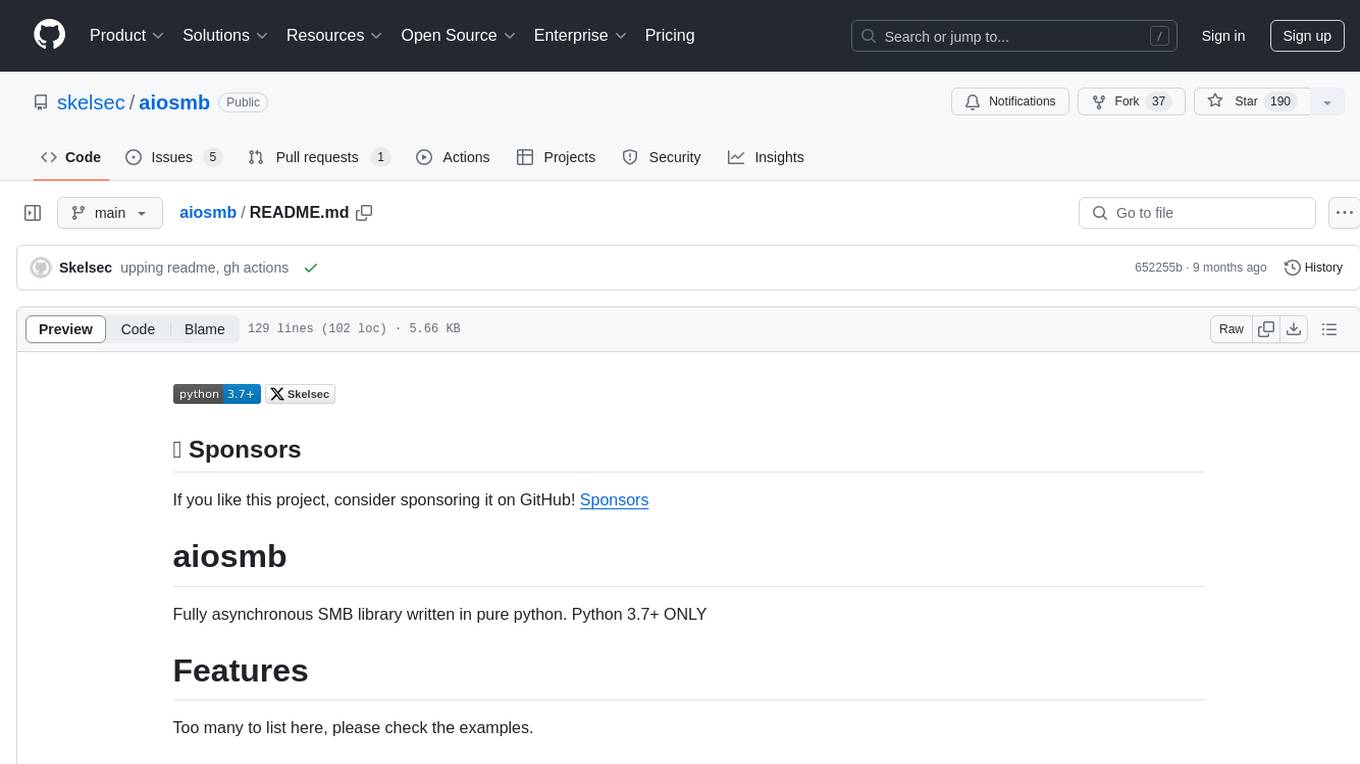
aiosmb
aiosmb is a fully asynchronous SMB library written in pure Python, supporting Python 3.7 and above. It offers various authentication methods such as Kerberos, NTLM, SSPI, and NEGOEX. The library supports connections over TCP and QUIC protocols, with proxy support for SOCKS4 and SOCKS5. Users can specify an SMB connection using a URL format, making it easier to authenticate and connect to SMB hosts. The project aims to implement DCERPC features, VSS mountpoint operations, and other enhancements in the future. It is inspired by Impacket and AzureADJoinedMachinePTC projects.
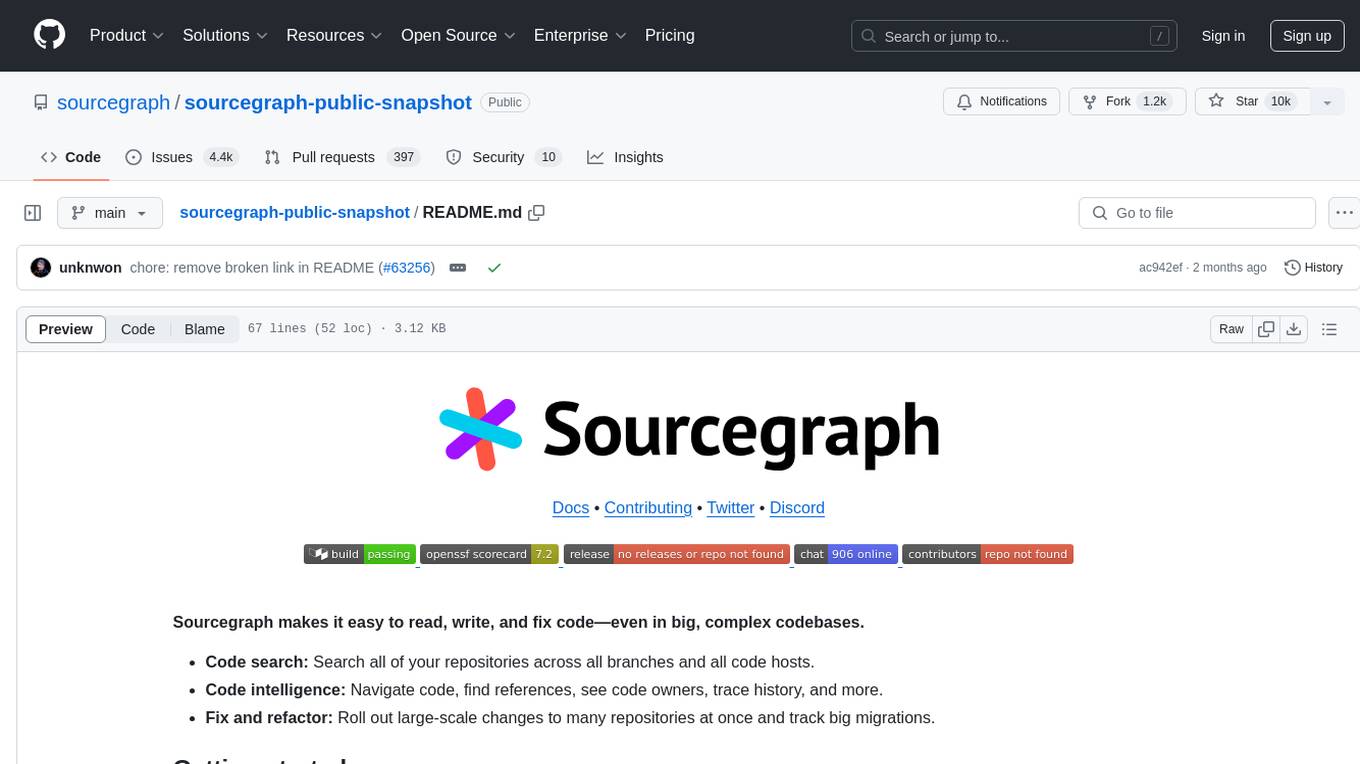
legacy-sourcegraph
Sourcegraph is a tool that simplifies reading, writing, and fixing code in large and complex codebases. It offers features such as code search across repositories and hosts, code intelligence for navigation and references, and the ability to roll out large-scale changes and track migrations. Sourcegraph can be used on the cloud or self-hosted, with public code search available on Sourcegraph.com. The tool provides high-level architecture documentation, database setup best practices, Go and documentation style guides, tips for modifying the GraphQL API, and guidelines for contributing.

arc
The Arc project aims to leverage Kotlin DSL and Kotlin Scripting to create a language optimized for developing LLM powered solutions. It provides a framework for building projects using Kotlin and offers documentation for guidance. The project follows the Contributor Covenant code of conduct and is licensed under Apache License, Version 2.0 by Deutsche Telekom AG. It adheres to the REUSE standard for software licensing, ensuring proper copyright and license information in each file.
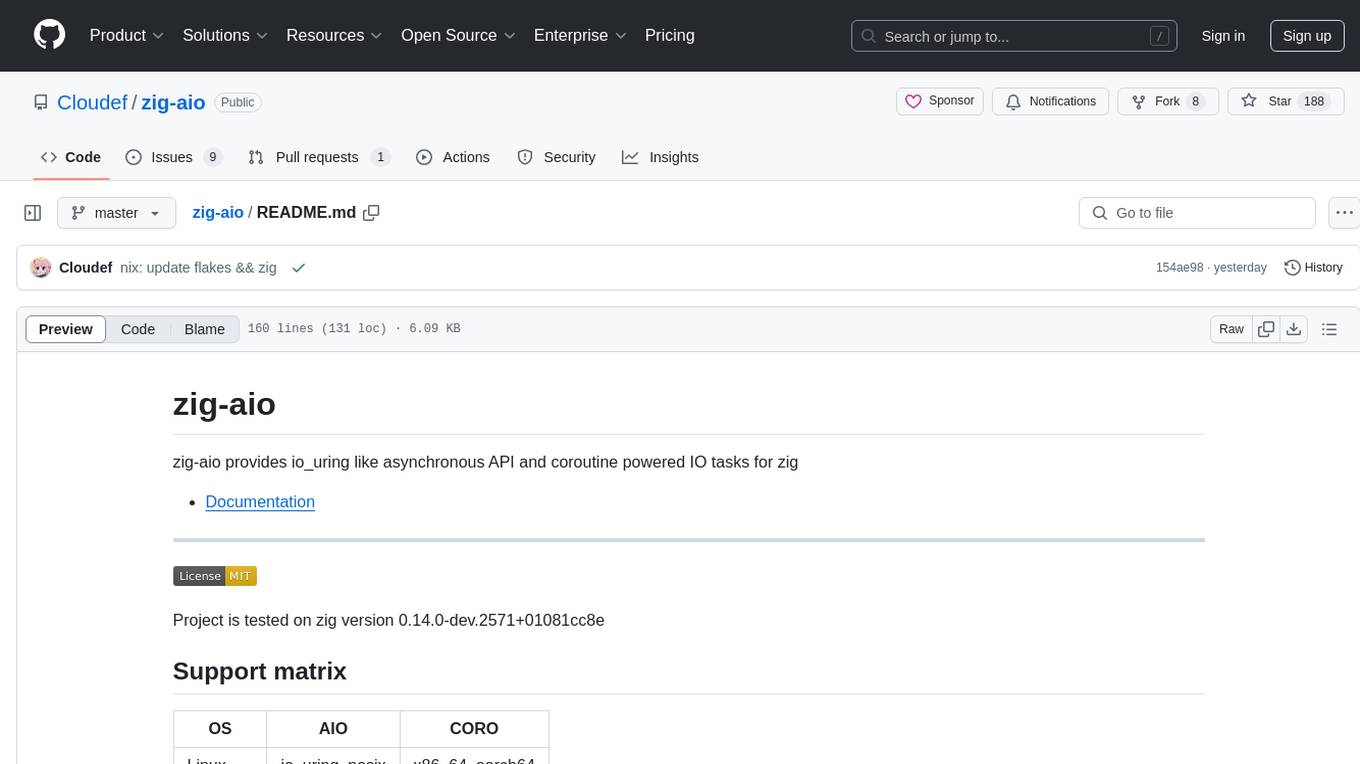
zig-aio
zig-aio is a library that provides an io_uring-like asynchronous API and coroutine-powered IO tasks for the Zig programming language. It offers support for different operating systems and backends, such as io_uring, iocp, and posix. The library aims to provide efficient IO operations by leveraging coroutines and async IO mechanisms. Users can create servers and clients with ease using the provided API functions for socket operations, sending and receiving data, and managing connections.
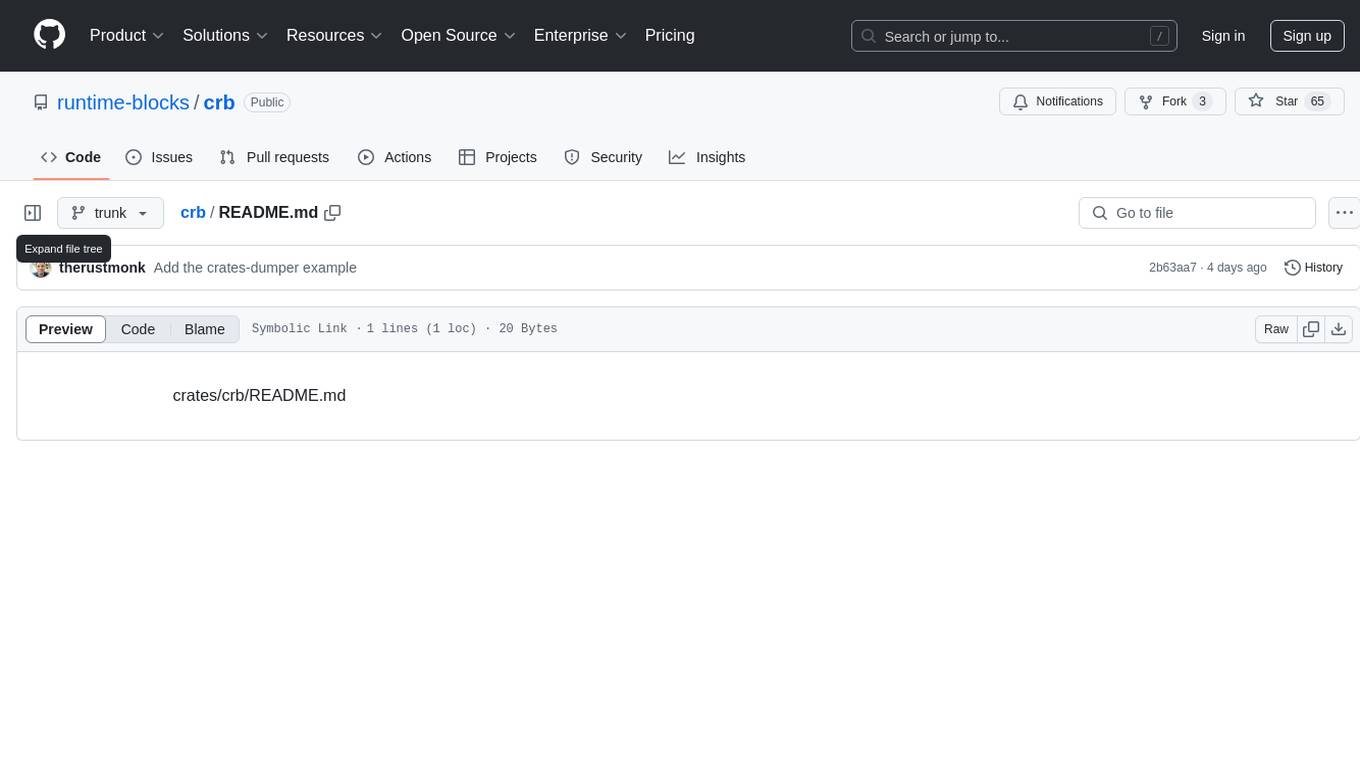
crb
CRB (Composable Runtime Blocks) is a unique framework that implements hybrid workloads by seamlessly combining synchronous and asynchronous activities, state machines, routines, the actor model, and supervisors. It is ideal for building massive applications and serves as a low-level framework for creating custom frameworks, such as AI-agents. The core idea is to ensure high compatibility among all blocks, enabling significant code reuse. The framework allows for the implementation of algorithms with complex branching, making it suitable for building large-scale applications or implementing complex workflows, such as AI pipelines. It provides flexibility in defining structures, implementing traits, and managing execution flow, allowing users to create robust and nonlinear algorithms easily.
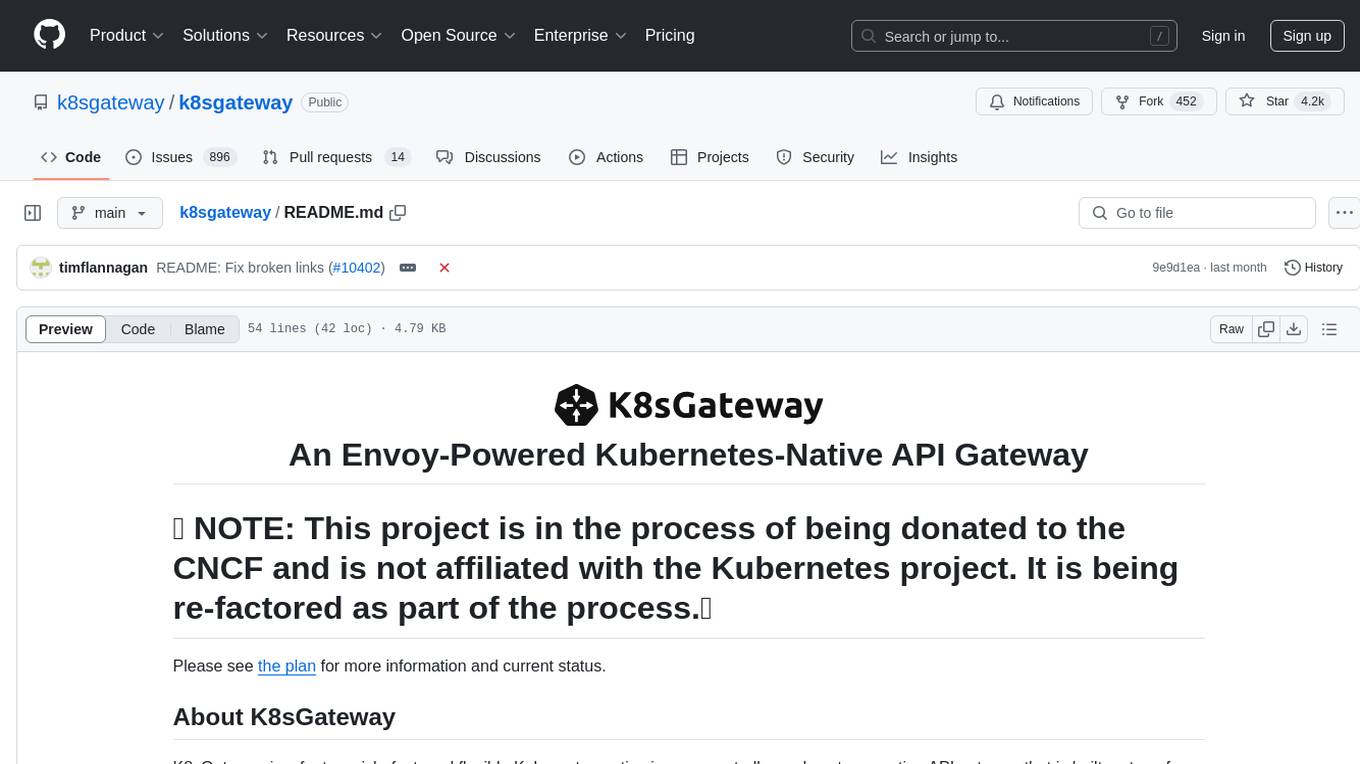
k8sgateway
K8sGateway is a feature-rich, fast, and flexible Kubernetes-native API gateway built on Envoy proxy and Kubernetes Gateway API. It excels in function-level routing, supports legacy apps, microservices, and serverless. It offers robust discovery capabilities, seamless integration with open-source projects, and supports hybrid applications with various technologies, architectures, protocols, and clouds.
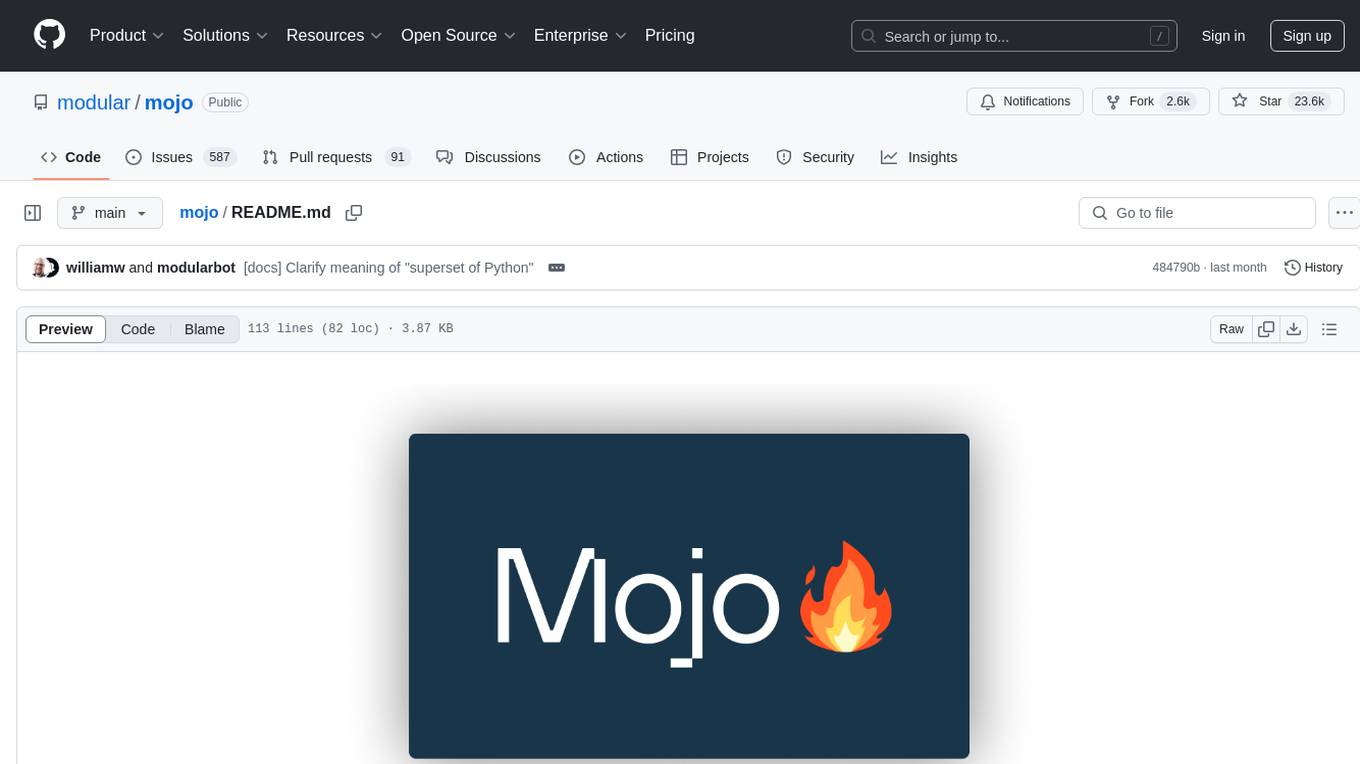
mojo
Mojo is a new programming language that combines Python syntax and ecosystem with systems programming and metaprogramming features. It aims to bridge the gap between research and production, designed to be the best way to extend Python over time. The repository includes source code for Mojo examples, documentation hosted at modular.com, and the Mojo standard library. It has two primary branches: 'main' for stable released versions and 'nightly' for the latest builds. To install Mojo, follow the guide for the last released build or use the nightly builds for a view of the development progress. Contributions are welcome on the 'nightly' branch, and the repository is licensed under the Apache License v2.0 with LLVM Exceptions.
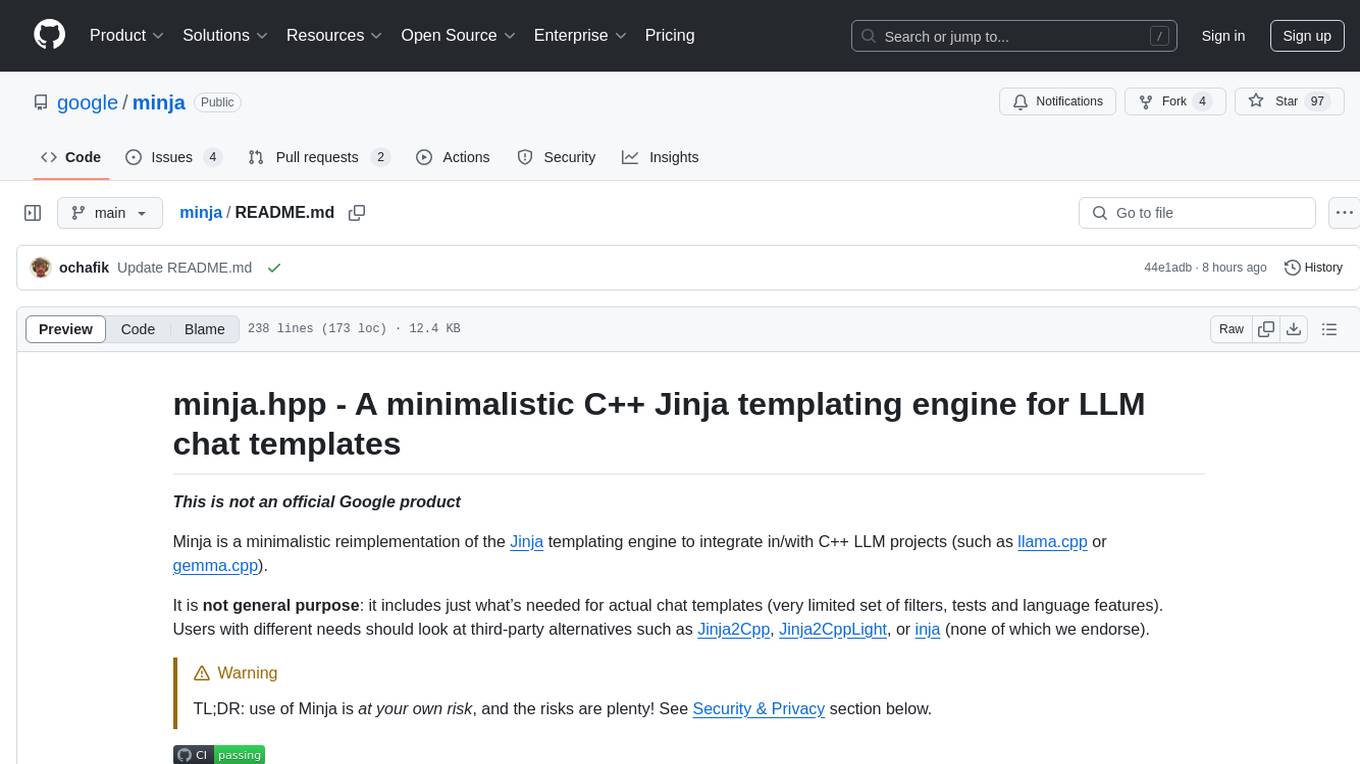
minja
Minja is a minimalistic C++ Jinja templating engine designed specifically for integration with C++ LLM projects, such as llama.cpp or gemma.cpp. It is not a general-purpose tool but focuses on providing a limited set of filters, tests, and language features tailored for chat templates. The library is header-only, requires C++17, and depends only on nlohmann::json. Minja aims to keep the codebase small, easy to understand, and offers decent performance compared to Python. Users should be cautious when using Minja due to potential security risks, and it is not intended for producing HTML or JavaScript output.
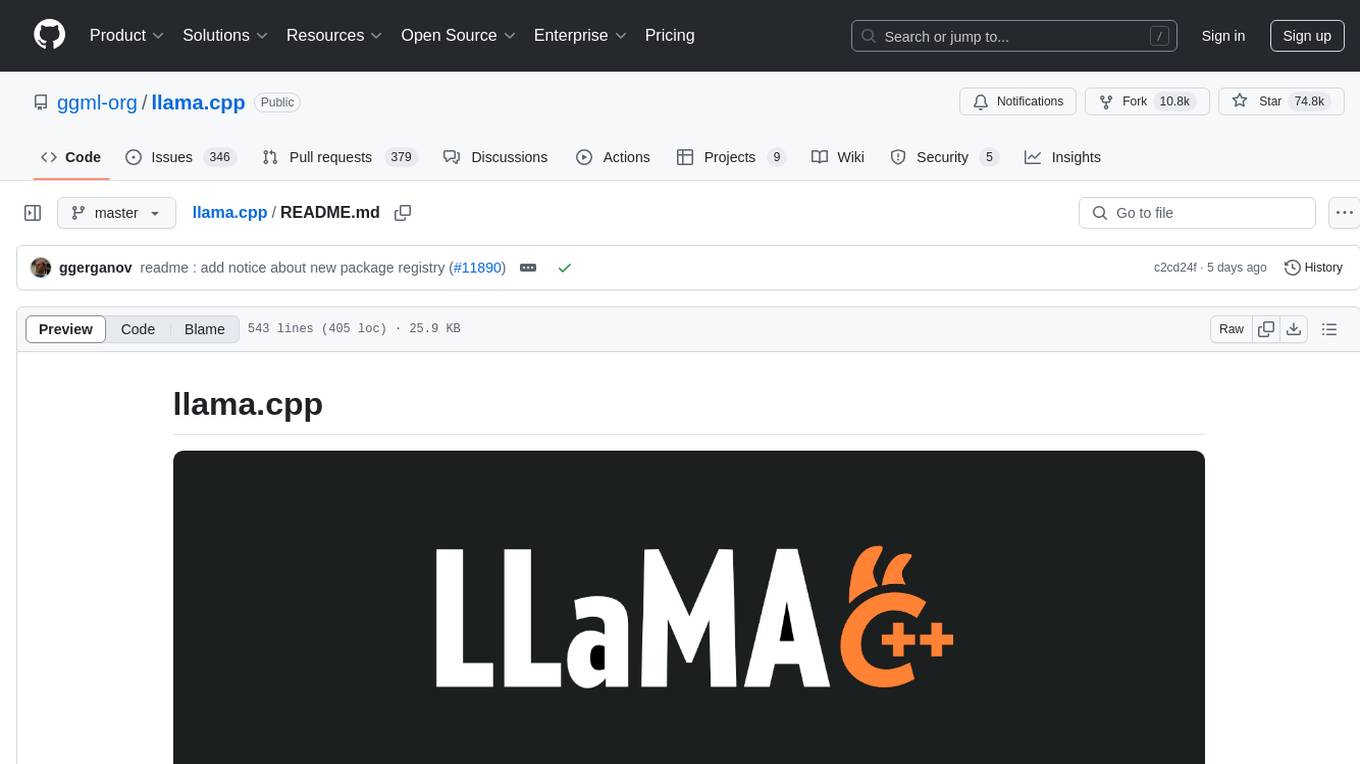
llama.cpp
The main goal of llama.cpp is to enable LLM inference with minimal setup and state-of-the-art performance on a wide range of hardware - locally and in the cloud. It provides a Plain C/C++ implementation without any dependencies, optimized for Apple silicon via ARM NEON, Accelerate and Metal frameworks, and supports various architectures like AVX, AVX2, AVX512, and AMX. It offers integer quantization for faster inference, custom CUDA kernels for NVIDIA GPUs, Vulkan and SYCL backend support, and CPU+GPU hybrid inference. llama.cpp is the main playground for developing new features for the ggml library, supporting various models and providing tools and infrastructure for LLM deployment.
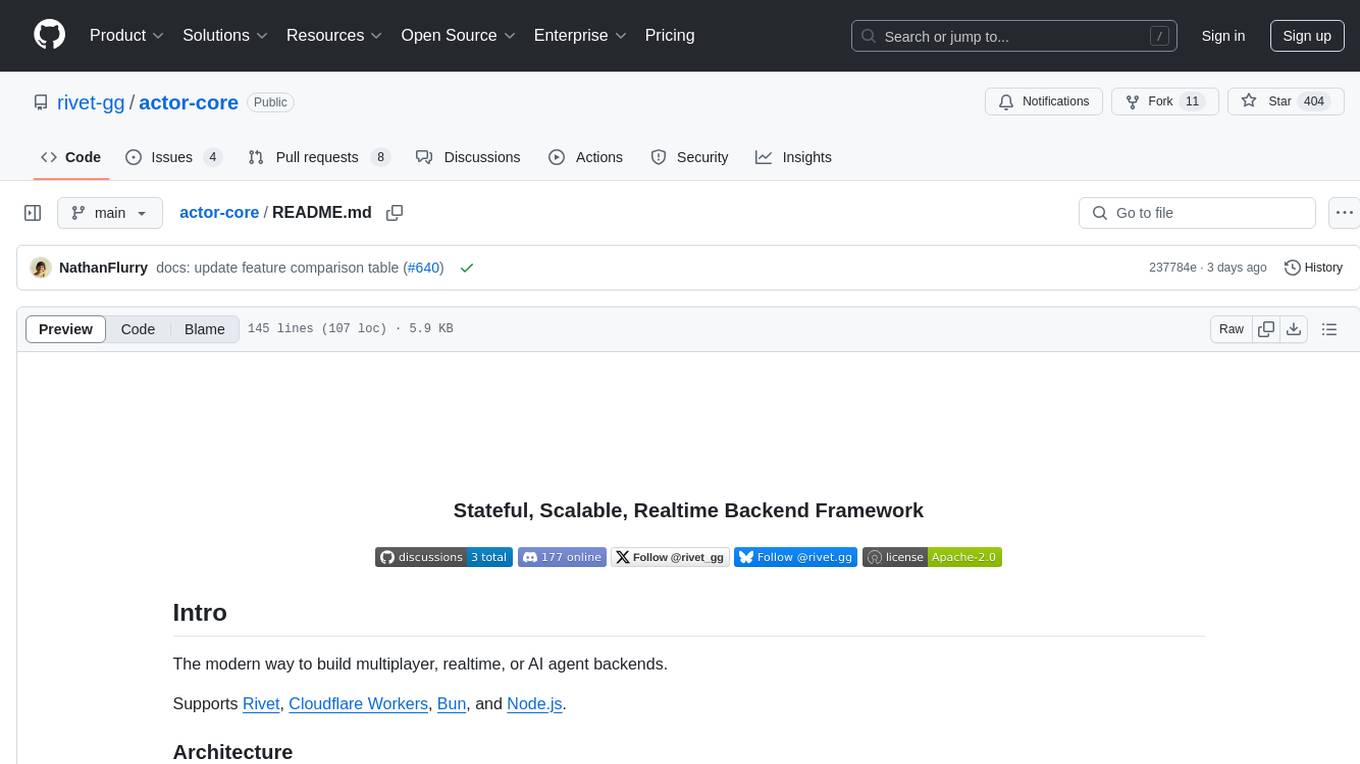
actor-core
Actor-core is a lightweight and flexible library for building actor-based concurrent applications in Java. It provides a simple API for creating and managing actors, as well as handling message passing between actors. With actor-core, developers can easily implement scalable and fault-tolerant systems using the actor model.
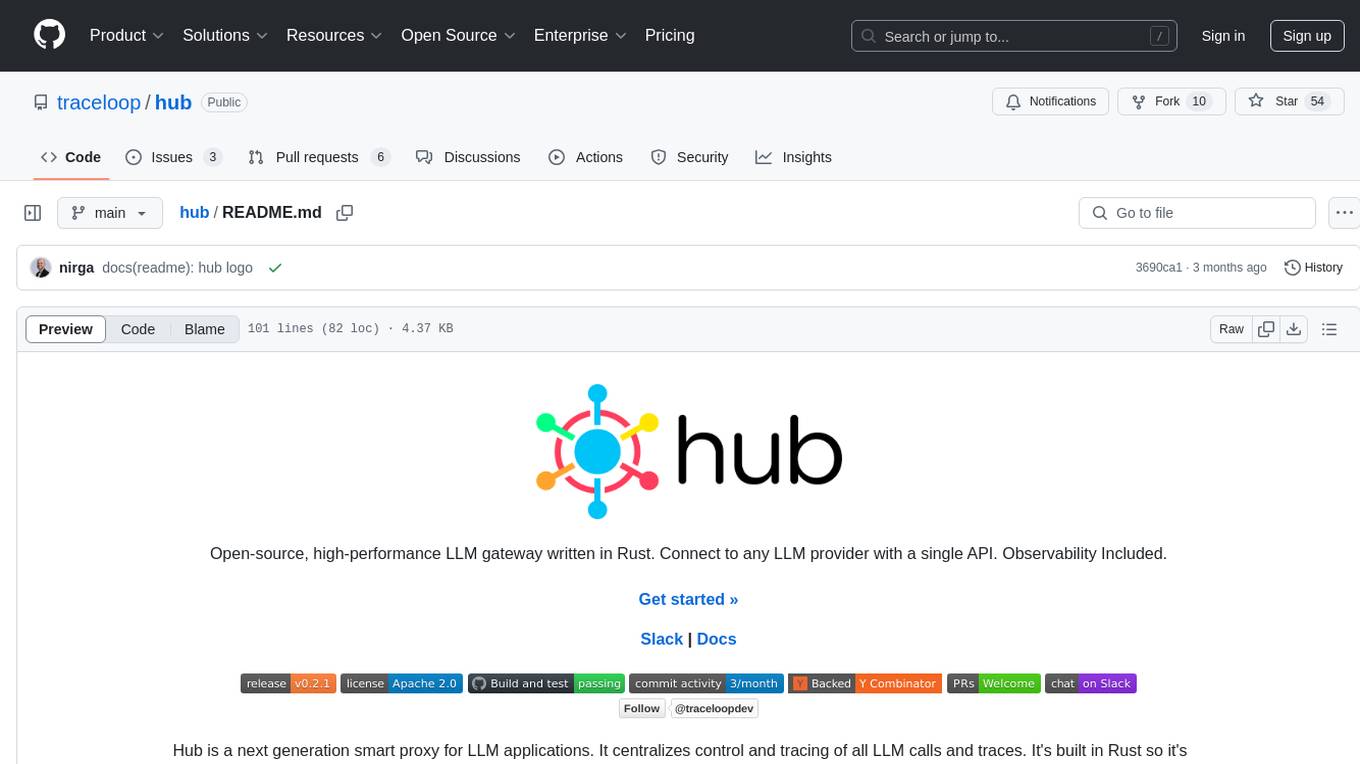
hub
Hub is an open-source, high-performance LLM gateway written in Rust. It serves as a smart proxy for LLM applications, centralizing control and tracing of all LLM calls and traces. Built for efficiency, it provides a single API to connect to any LLM provider. The tool is designed to be fast, efficient, and completely open-source under the Apache 2.0 license.
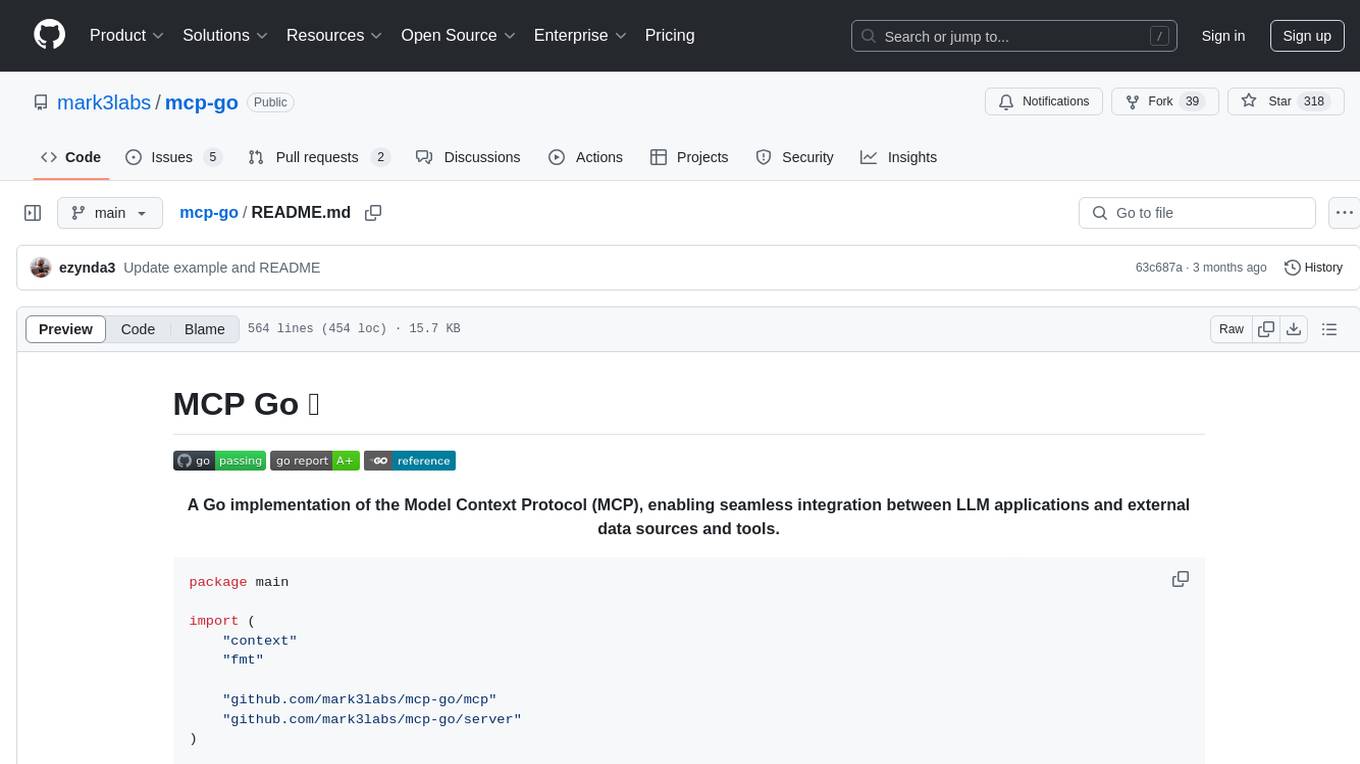
mcp-go
MCP Go is a Go implementation of the Model Context Protocol (MCP), facilitating seamless integration between LLM applications and external data sources and tools. It handles complex protocol details and server management, allowing developers to focus on building tools. The tool is designed to be fast, simple, and complete, aiming to provide a high-level and easy-to-use interface for developing MCP servers. MCP Go is currently under active development, with core features working and advanced capabilities in progress.
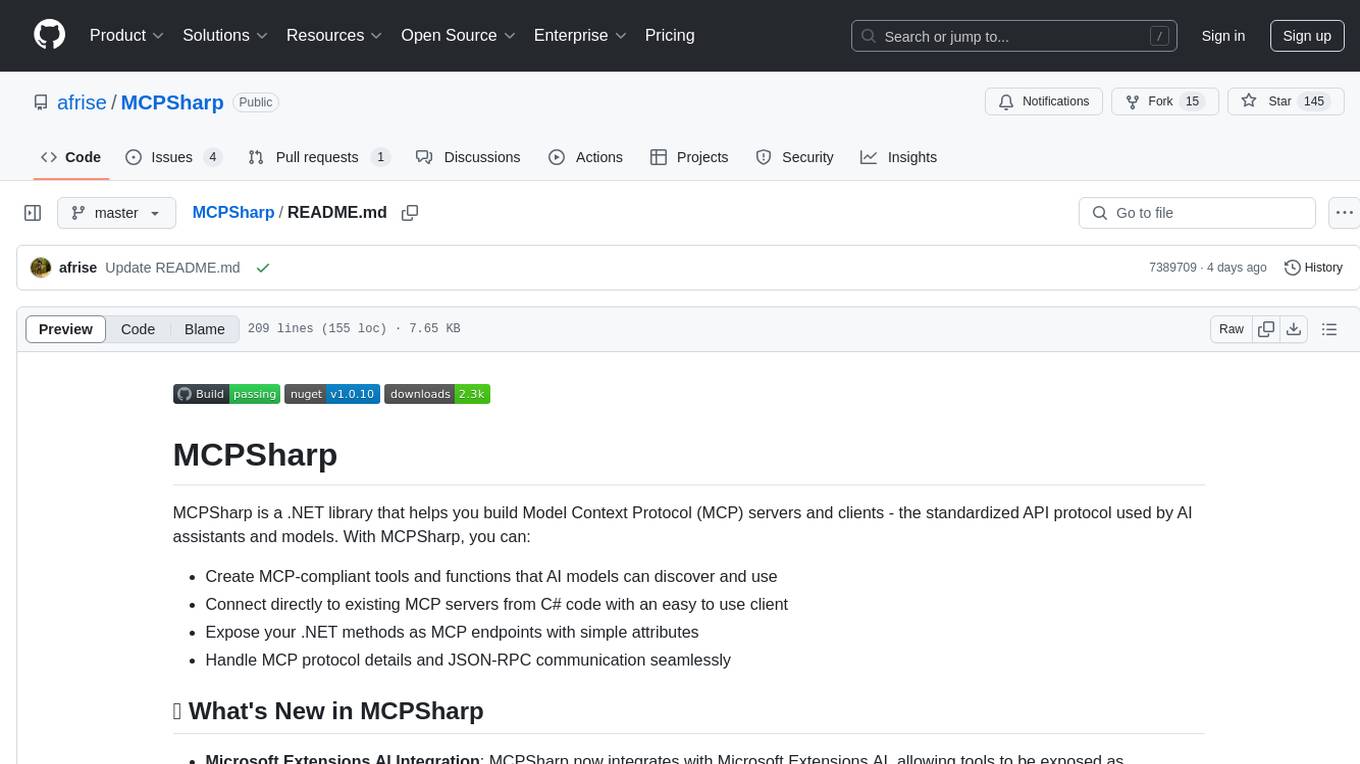
MCPSharp
MCPSharp is a .NET library that helps build Model Context Protocol (MCP) servers and clients for AI assistants and models. It allows creating MCP-compliant tools, connecting to existing MCP servers, exposing .NET methods as MCP endpoints, and handling MCP protocol details seamlessly. With features like attribute-based API, JSON-RPC support, parameter validation, and type conversion, MCPSharp simplifies the development of AI capabilities in applications through standardized interfaces.
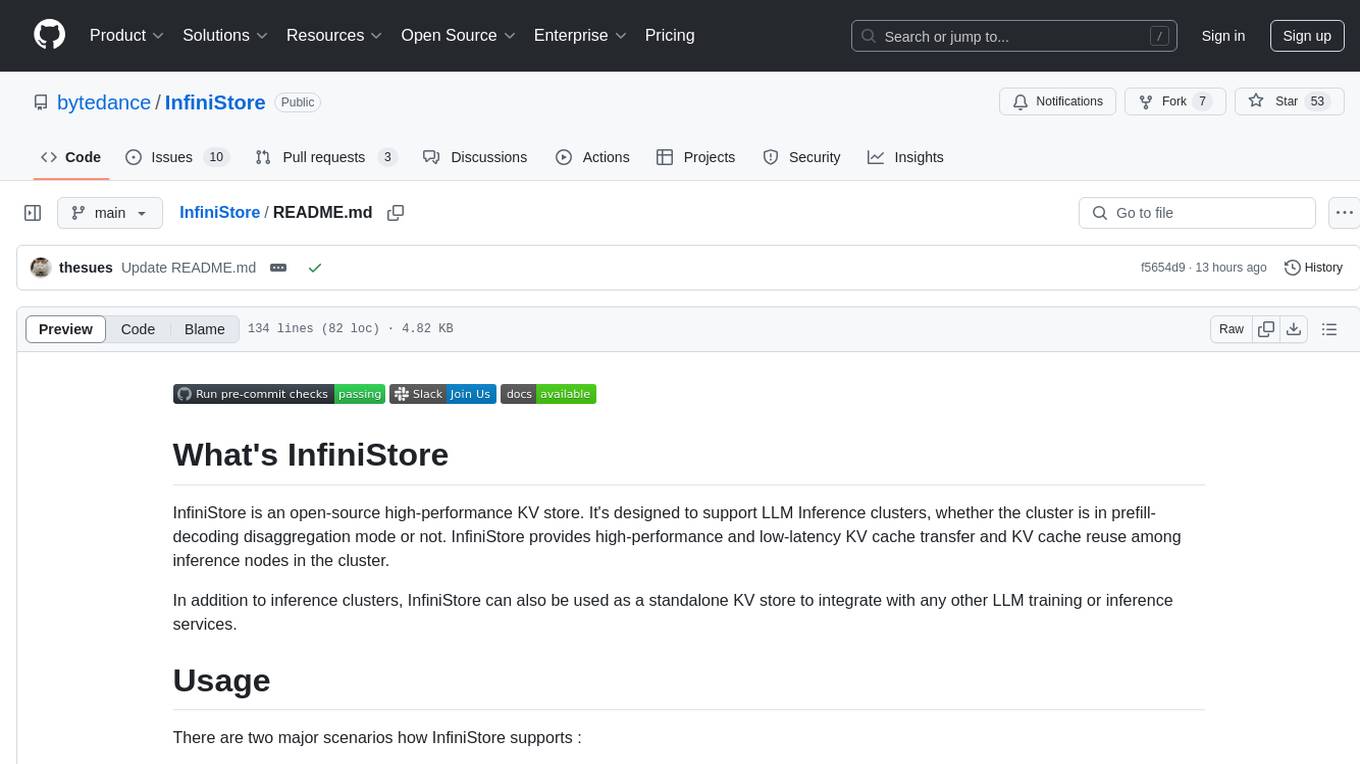
InfiniStore
InfiniStore is an open-source high-performance KV store designed to support LLM Inference clusters. It provides high-performance and low-latency KV cache transfer and reuse among inference nodes. In addition to inference clusters, it can be used as a standalone KV store for integration with LLM training or inference services. InfiniStore is currently integrated with vLLM via LMCache and is in progress for integration with SGLang and other inference engines.
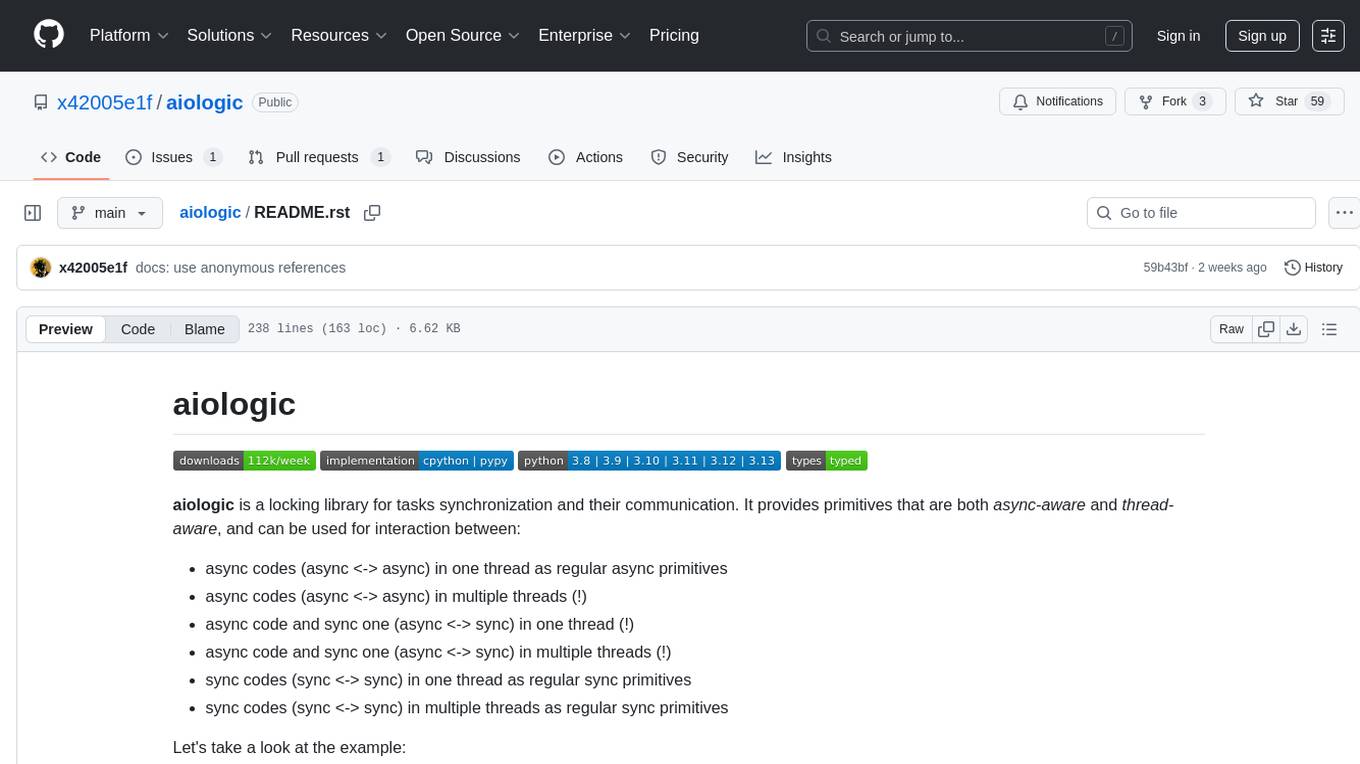
aiologic
aiologic is a locking library for tasks synchronization and their communication. It provides primitives that are both async-aware and thread-aware, and can be used for interaction between async codes (async <-> async) in one thread as regular async primitives, async codes (async <-> async) in multiple threads, async code and sync one (async <-> sync) in one thread, async code and sync one (async <-> sync) in multiple threads, sync codes (sync <-> sync) in one thread as regular sync primitives, sync codes (sync <-> sync) in multiple threads as regular sync primitives. It offers synchronization primitives like events, barriers, semaphores, capacity limiters, locks, readers-writer locks, condition variables, communication primitives like queues, non-blocking primitives like flags and resource guards, and supports various concurrency libraries like asyncio, curio, trio, anyio, eventlet, gevent, and threading. aiologic is implemented entirely on effectively atomic operations, providing incredible speedup on PyPy compared to alternatives from the threading module. It works in free-threaded mode and ensures atomic operations even with GIL.
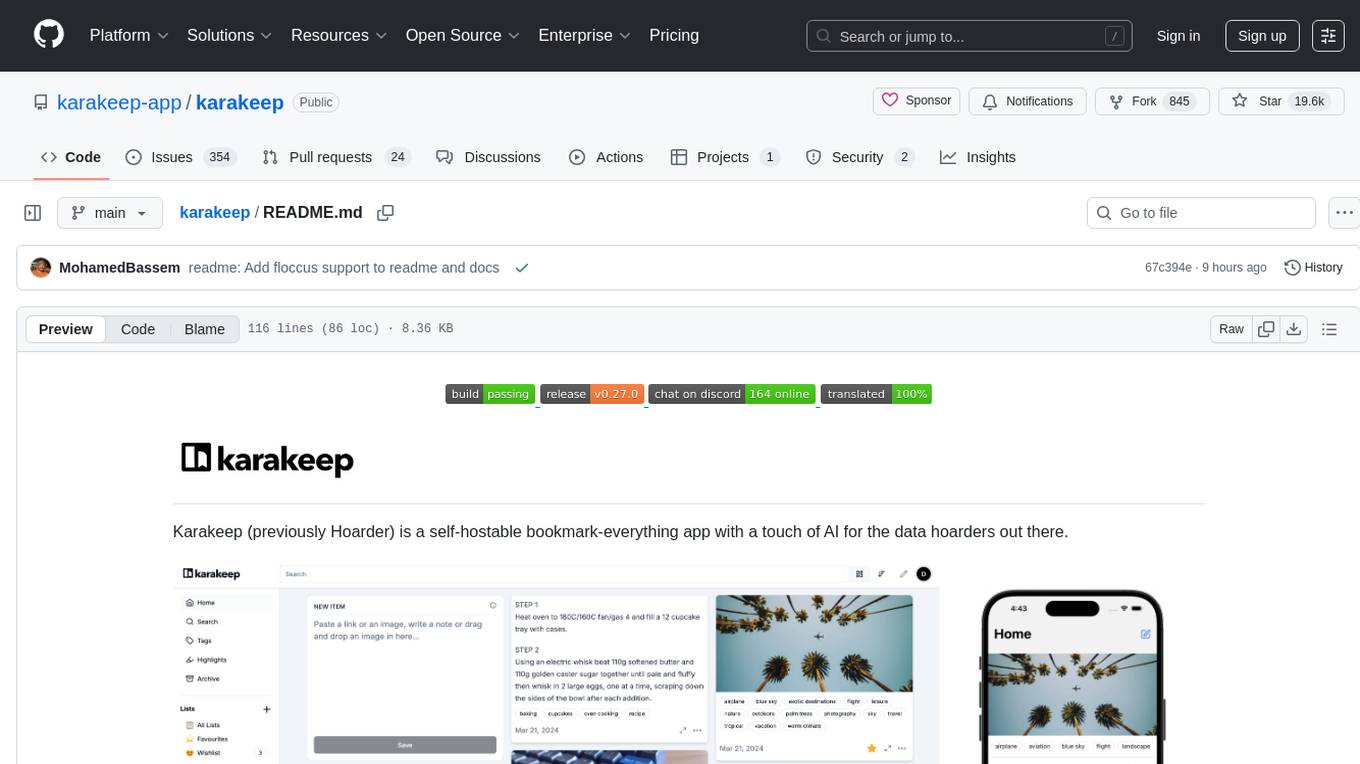
karakeep
Karakeep is a self-hostable bookmark-everything app with a touch of AI for data hoarders. It allows users to bookmark links, take notes, store images and pdfs, and offers features like automatic fetching, full-text search, AI-based tagging, OCR, rule-based engine, Chrome plugin, Firefox addon, iOS and Android apps, auto hoarding from RSS feeds, REST API, multi-language support, and more. The app is under heavy development and aims to provide a self-hosting first solution for managing bookmarks and content.
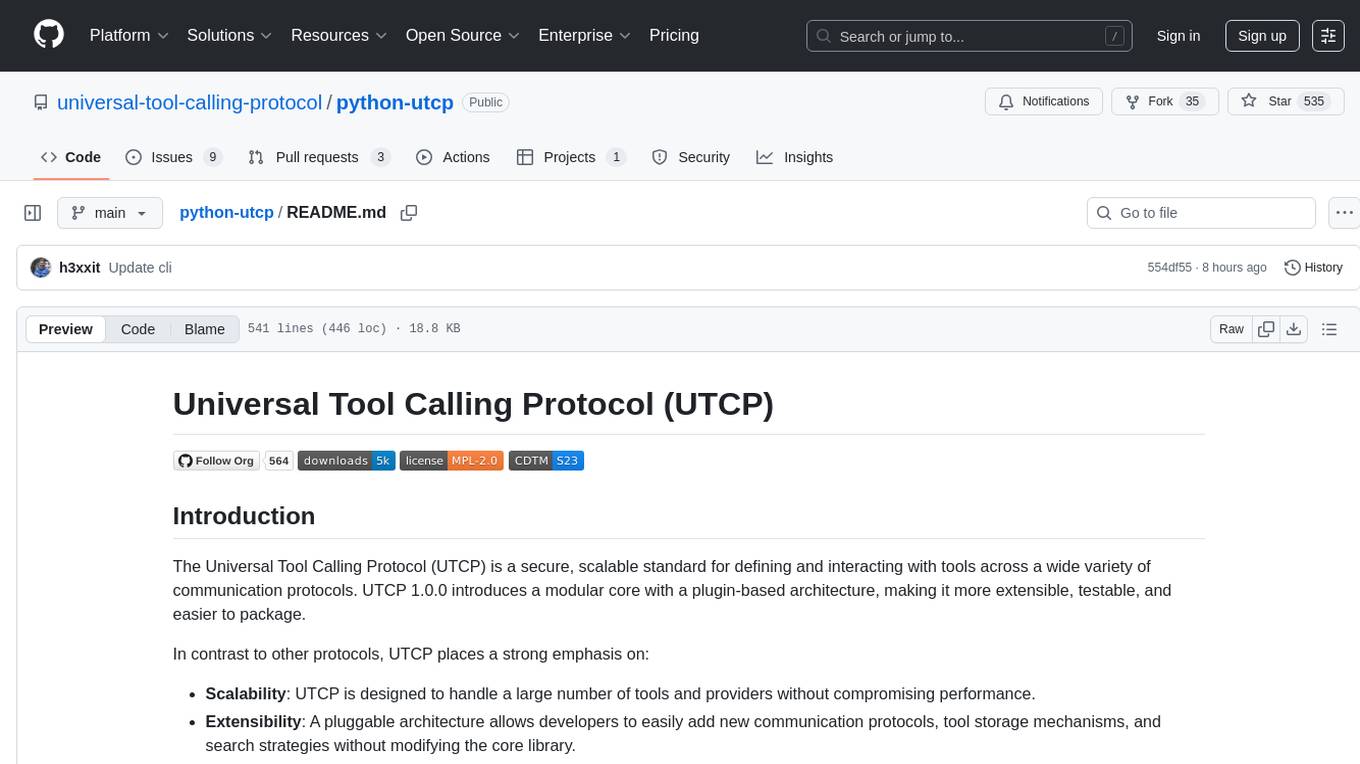
python-utcp
The Universal Tool Calling Protocol (UTCP) is a secure and scalable standard for defining and interacting with tools across various communication protocols. UTCP emphasizes scalability, extensibility, interoperability, and ease of use. It offers a modular core with a plugin-based architecture, making it extensible, testable, and easy to package. The repository contains the complete UTCP Python implementation with core components and protocol-specific plugins for HTTP, CLI, Model Context Protocol, file-based tools, and more.
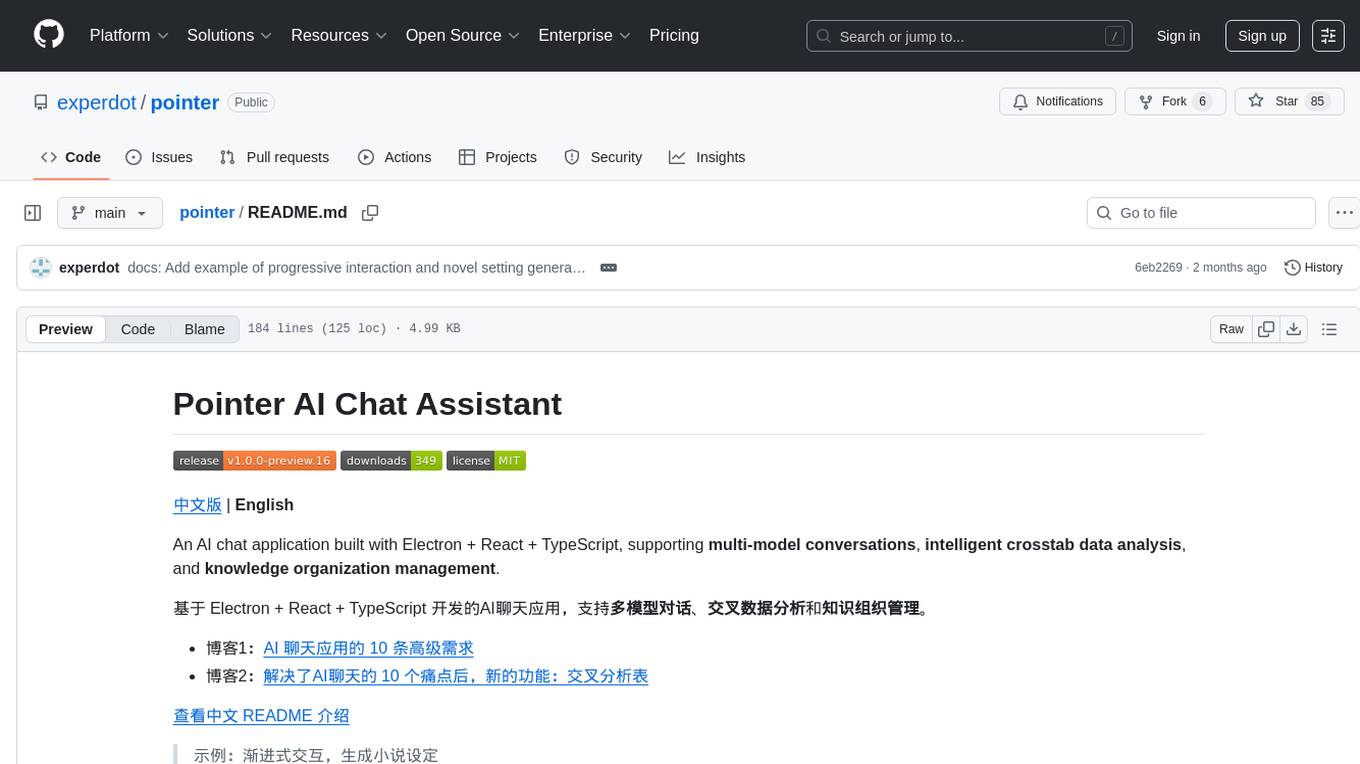
pointer
Pointer is a lightweight and efficient tool for analyzing and visualizing data structures in C and C++ programs. It provides a user-friendly interface to track memory allocations, pointer references, and data structures, helping developers to identify memory leaks, pointer errors, and optimize memory usage. With Pointer, users can easily navigate through complex data structures, visualize memory layouts, and debug pointer-related issues in their codebase. The tool offers interactive features such as memory snapshots, pointer tracking, and memory visualization, making it a valuable asset for C and C++ developers working on memory-intensive applications.
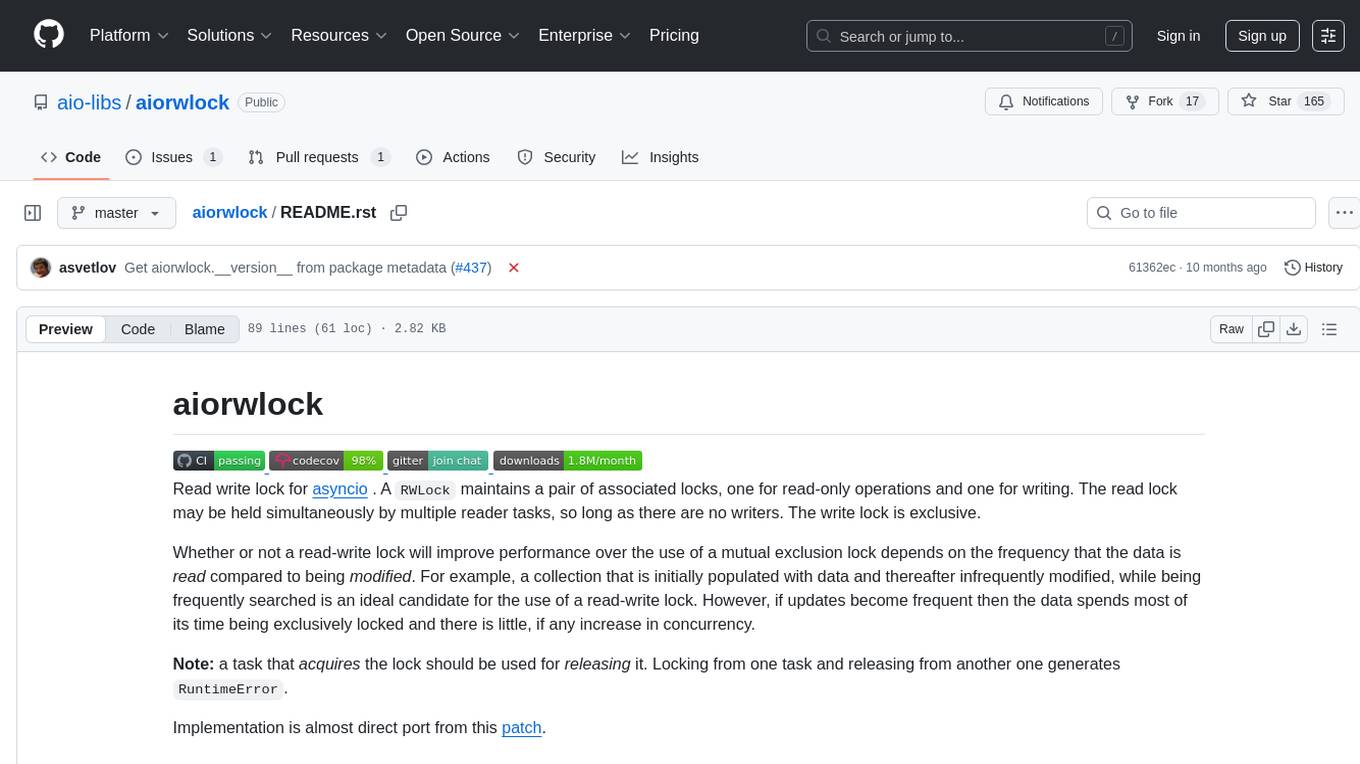
aiorwlock
Read write lock for asyncio. A RWLock maintains a pair of associated locks, one for read-only operations and one for writing. The read lock may be held simultaneously by multiple reader tasks, so long as there are no writers. The write lock is exclusive. Whether or not a read-write lock will improve performance over the use of a mutual exclusion lock depends on the frequency that the data is read compared to being modified. For example, a collection that is initially populated with data and thereafter infrequently modified, while being frequently searched is an ideal candidate for the use of a read-write lock. However, if updates become frequent then the data spends most of its time being exclusively locked and there is little, if any increase in concurrency. Note: a task that acquires the lock should be used for releasing it. Locking from one task and releasing from another one generates RuntimeError. Implementation is almost direct port from a patch.
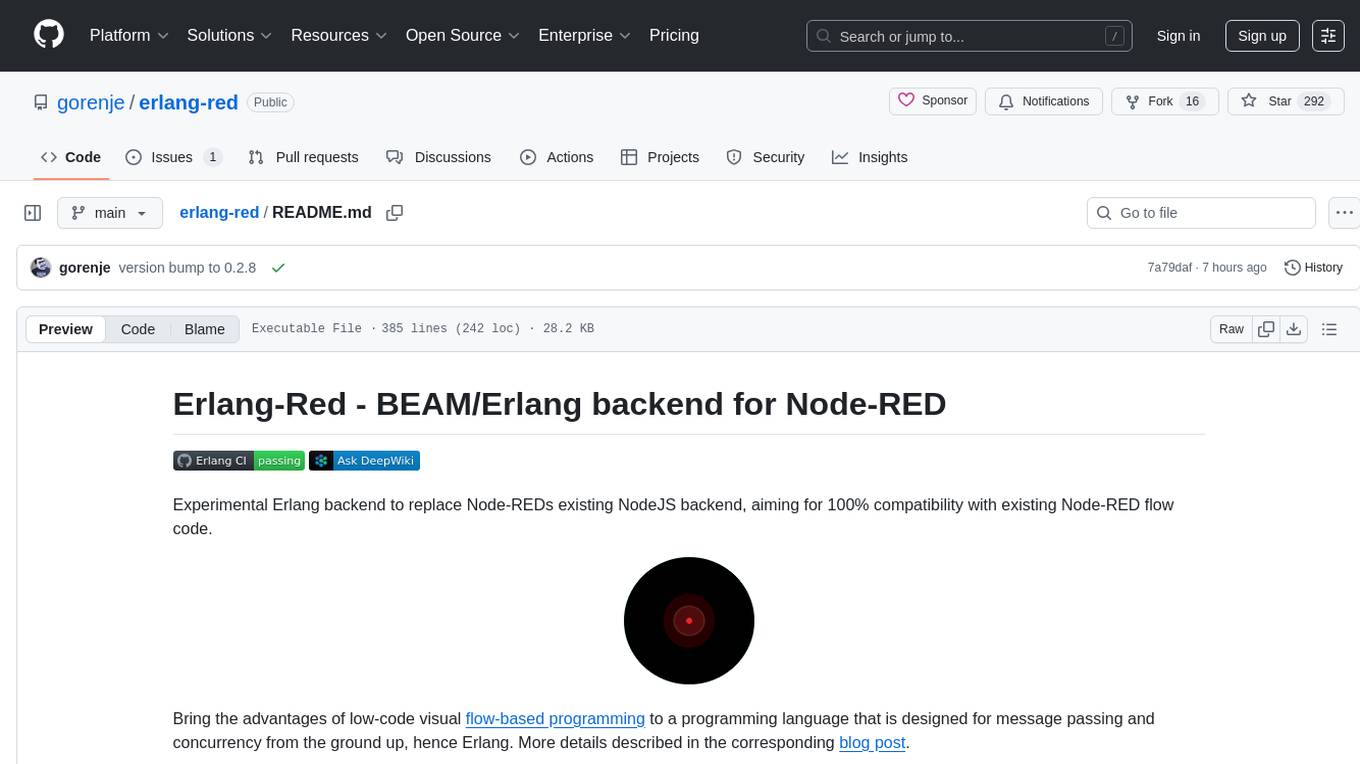
erlang-red
Erlang-Red is an experimental Erlang backend designed to replace Node-RED's existing NodeJS backend, aiming for 100% compatibility with existing Node-RED flow code. It brings the advantages of low-code visual flow-based programming to Erlang, a language designed for message passing and concurrency. The tool allows for creating data flows that describe concurrent processing with guaranteed concurrency and performance. Erlang-Red provides a visual flow editor for creating and testing flows, supporting various Node-RED core nodes and Erlang-specific nodes. The development process is flow-driven, with test flows ensuring correct node functionality. The tool can be deployed locally using Docker or on platforms like Fly.io and Heroku. Contributions in the form of Erlang code, Node-RED test flows, and Elixir code are welcome, with a focus on replicating Node-RED functionality in alternative programming languages.
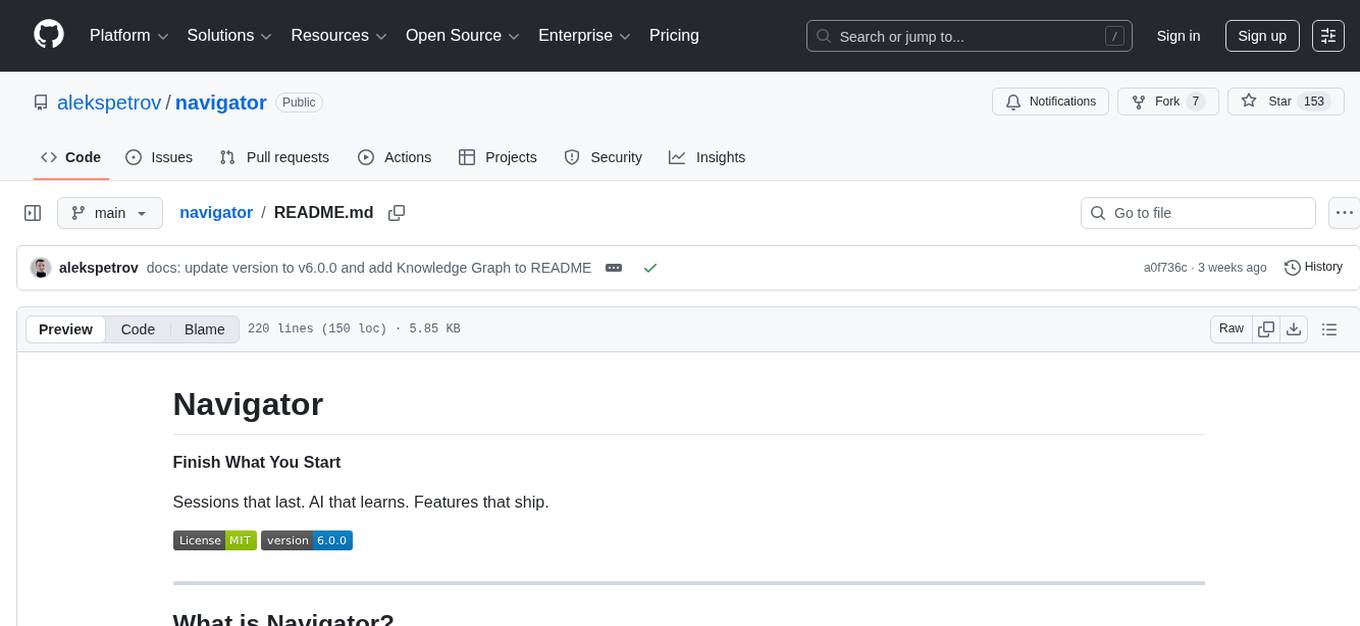
navigator
Navigator is a versatile tool for navigating through complex codebases efficiently. It provides a user-friendly interface to explore code files, search for specific functions or variables, and visualize code dependencies. With Navigator, developers can easily understand the structure of a project and quickly locate relevant code snippets. The tool supports various programming languages and offers customizable settings to enhance the coding experience. Whether you are working on a small project or a large codebase, Navigator can help you streamline your development process and improve code comprehension.
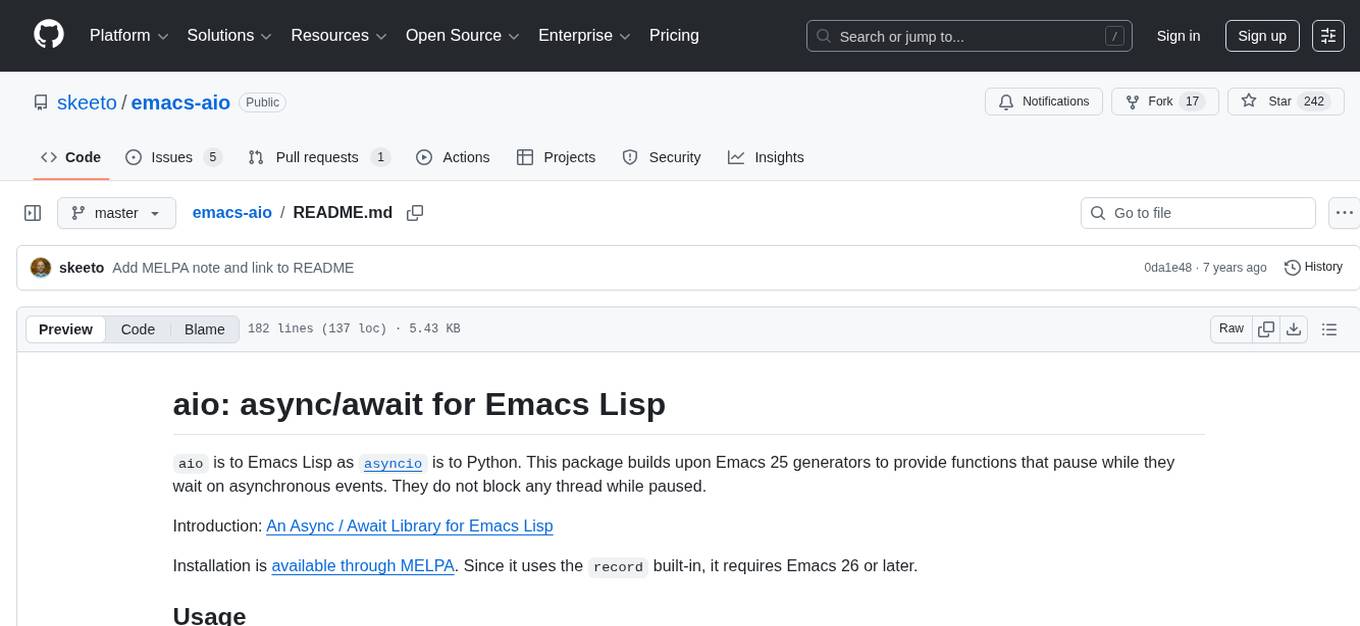
emacs-aio
The 'emacs-aio' repository provides an async/await library for Emacs Lisp, similar to 'asyncio' in Python. It allows functions to pause while waiting on asynchronous events without blocking any threads. Users can define async functions using 'aio-defun' or 'aio-lambda' and pause execution with 'aio-await'. The package offers utility macros and functions for synchronous waiting, cancellation, and async evaluation. Additionally, it includes awaitable functions like 'aio-sleep' and 'aio-url-retrieve', a select()-like API for waiting on multiple promises, and a semaphore API for thread synchronization. 'emacs-aio' enables users to create async-friendly functions and handle async operations in Emacs Lisp effectively.
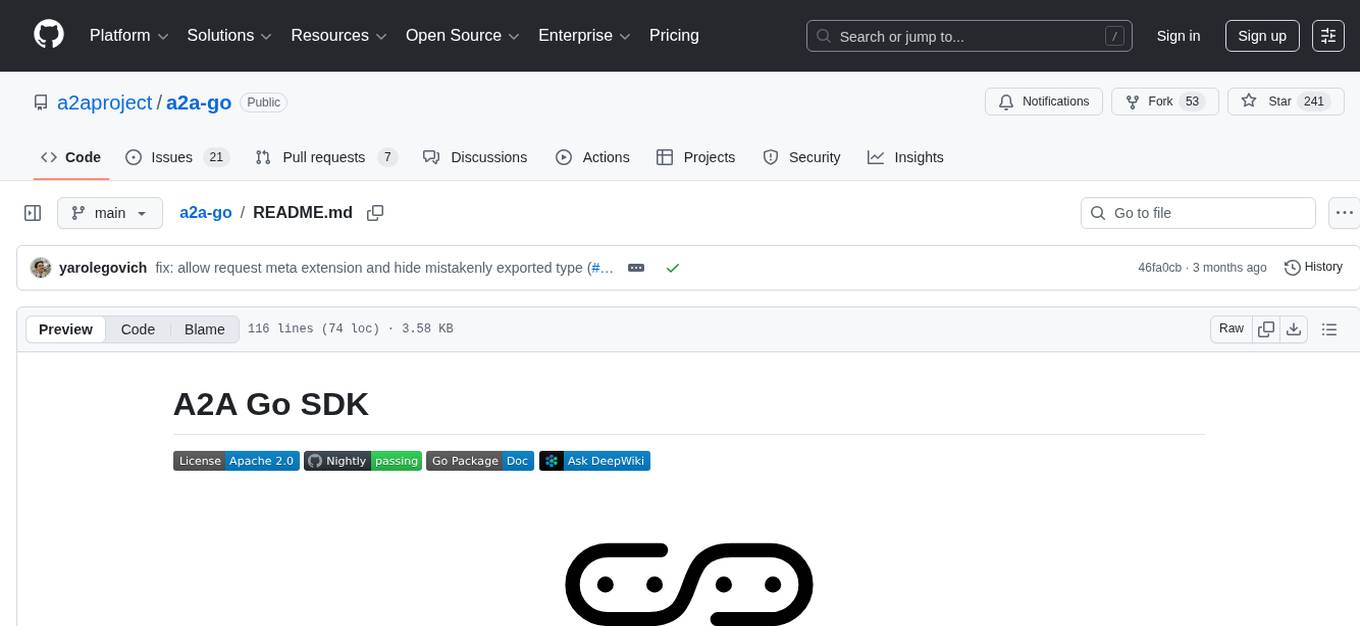
a2a-go
A2A Go SDK is a Go library for running agentic applications as A2A Servers, following the Agent2Agent (A2A) Protocol. It allows users to build agentic applications that adhere to the A2A Protocol and easily add support for different communication protocols and database backends. The SDK provides examples for creating A2A servers and clients, along with detailed documentation and more examples in the a2a-samples repository. Contributions are welcome, and the project is licensed under the Apache 2.0 License.
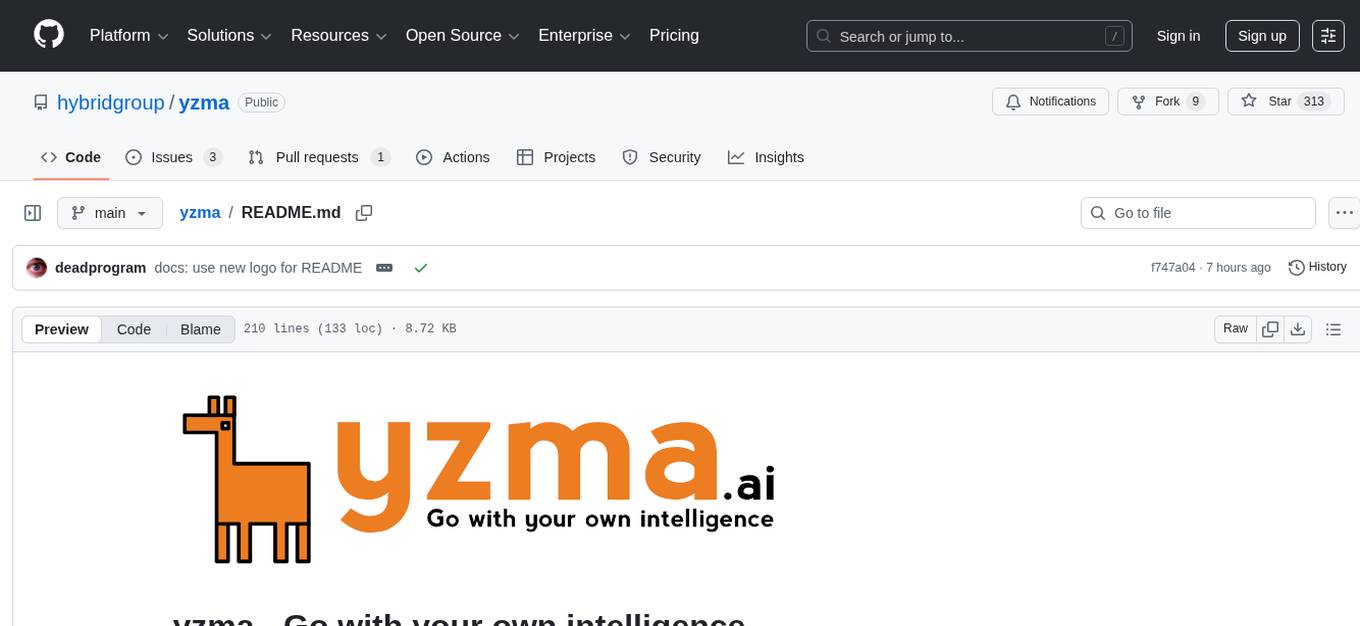
yzma
yzma is a tool that allows you to write Go applications integrating llama.cpp for local inference using hardware acceleration. It supports running Vision Language Models (VLM) and Large/Small/Tiny Language Models (LLM) on Linux, macOS, or Windows with hardware acceleration like CUDA, Metal, or Vulkan. yzma uses purego and ffi packages, eliminating the need for CGo. It works with the latest llama.cpp releases, enabling users to leverage the newest features and model support.
24 - OpenAI Gpts
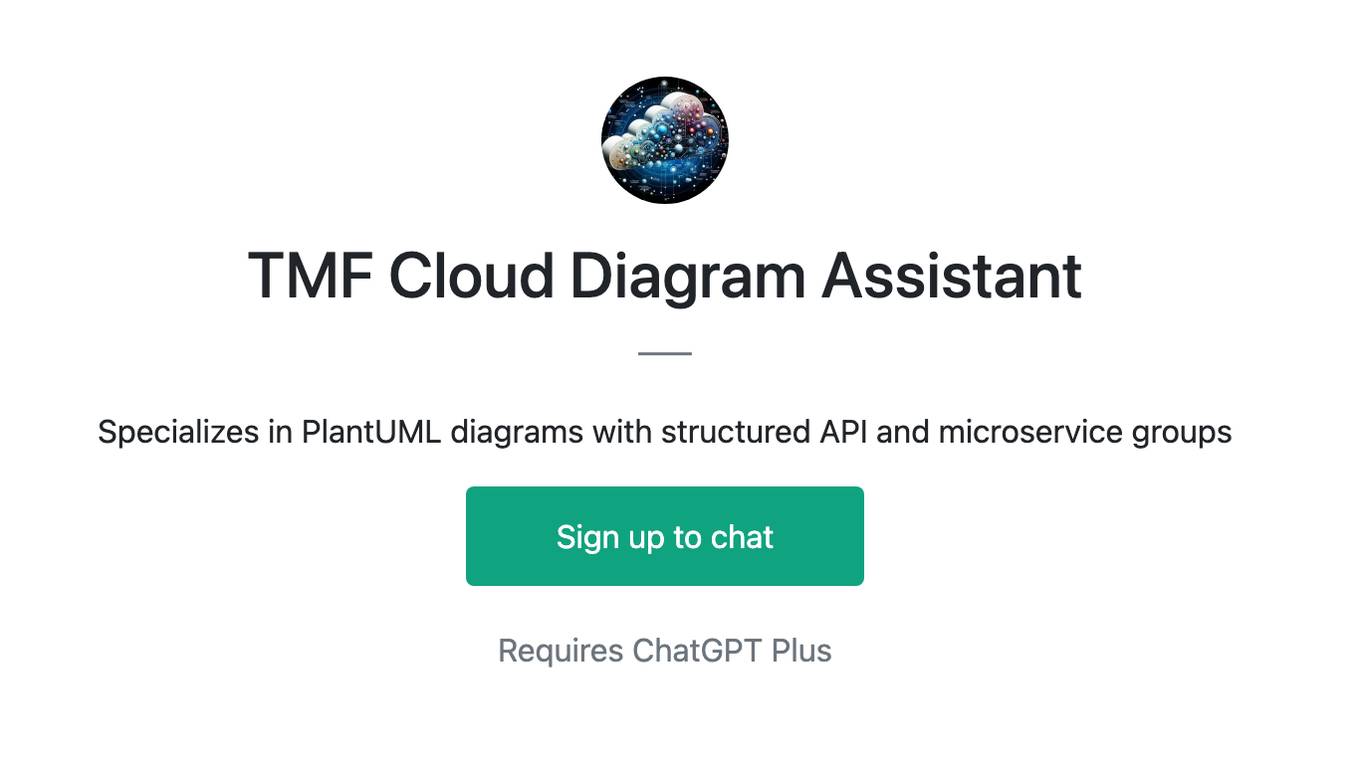
TMF Cloud Diagram Assistant
Specializes in PlantUML diagrams with structured API and microservice groups

System Design Tutor
A System Architect Coach guiding you through system design principles and best practices. Explains CAP theorem like no one else
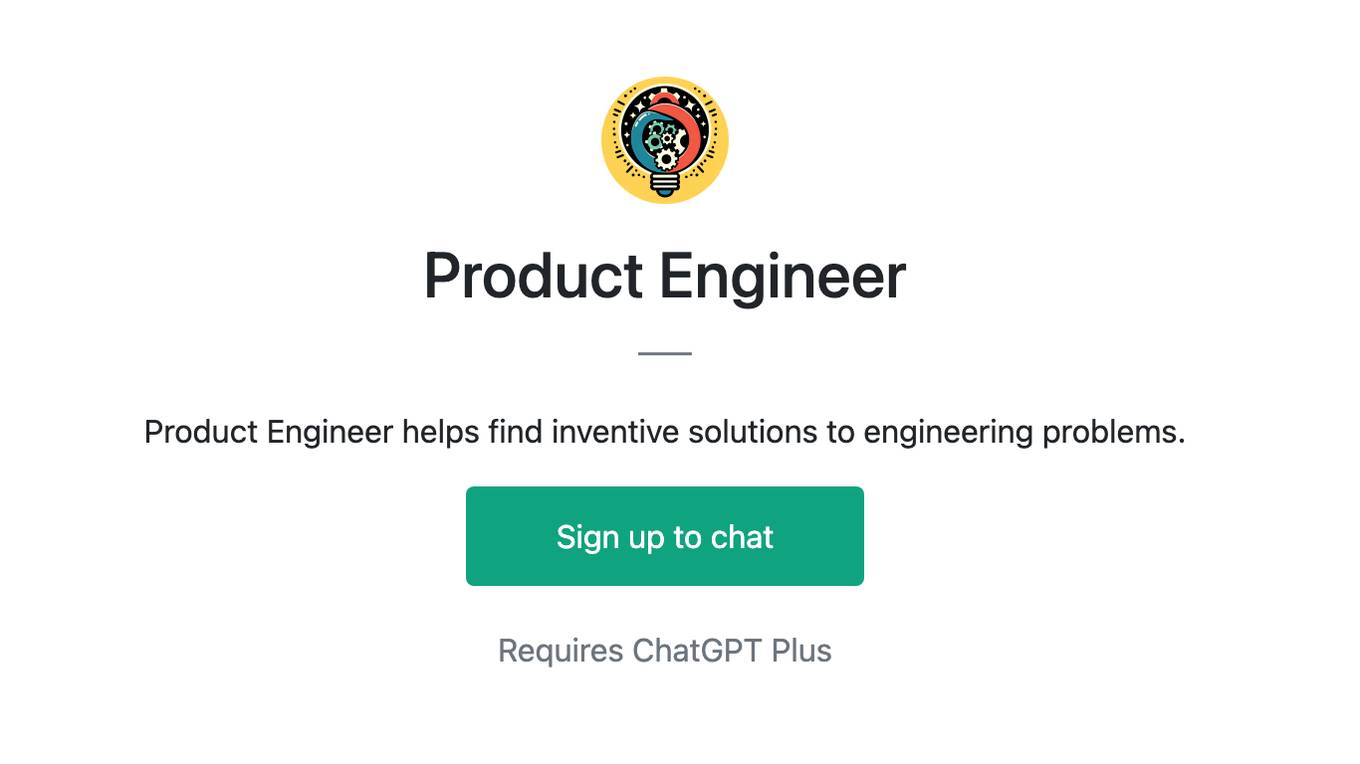
Product Engineer
Product Engineer helps find inventive solutions to engineering problems.

FlashSystem Expert
Expert on IBM FlashSystem, offering 'How-To' guidance and technical insights.
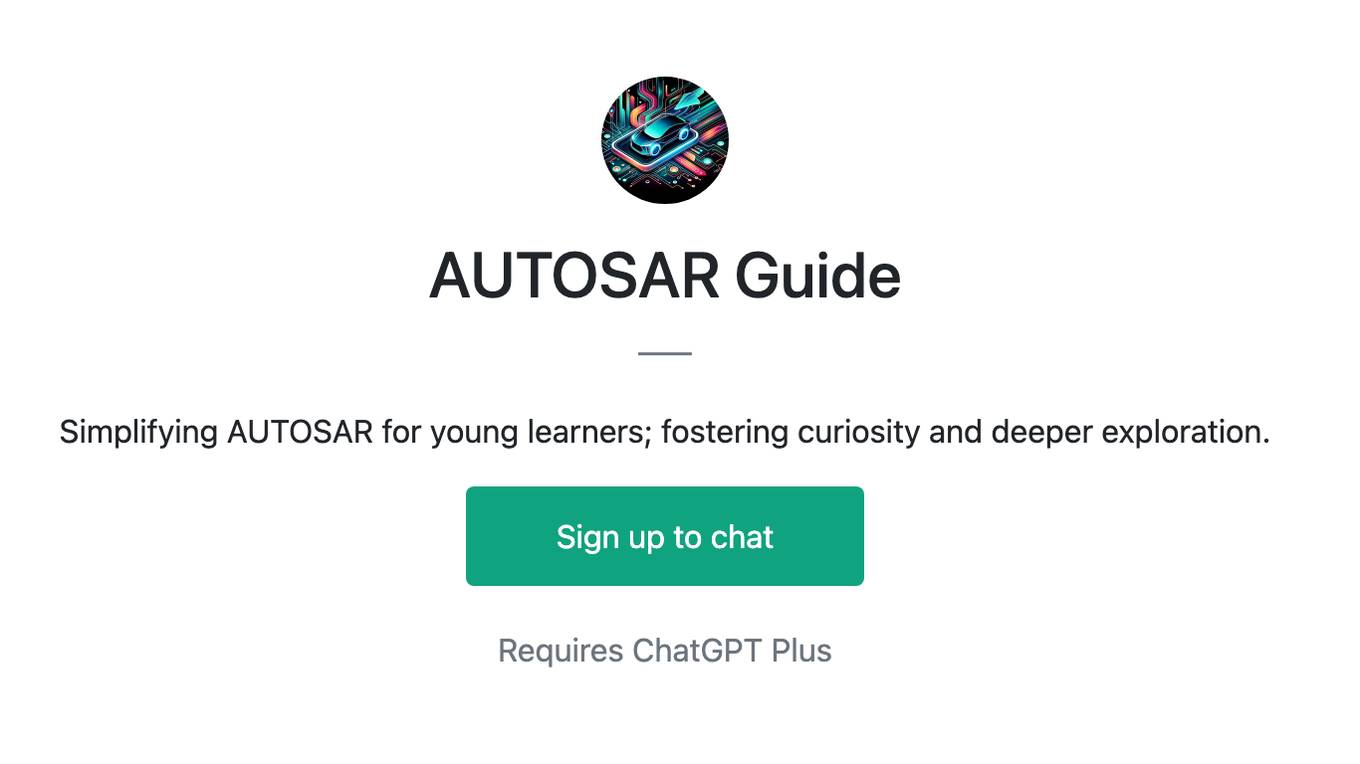
AUTOSAR Guide
Simplifying AUTOSAR for young learners; fostering curiosity and deeper exploration.
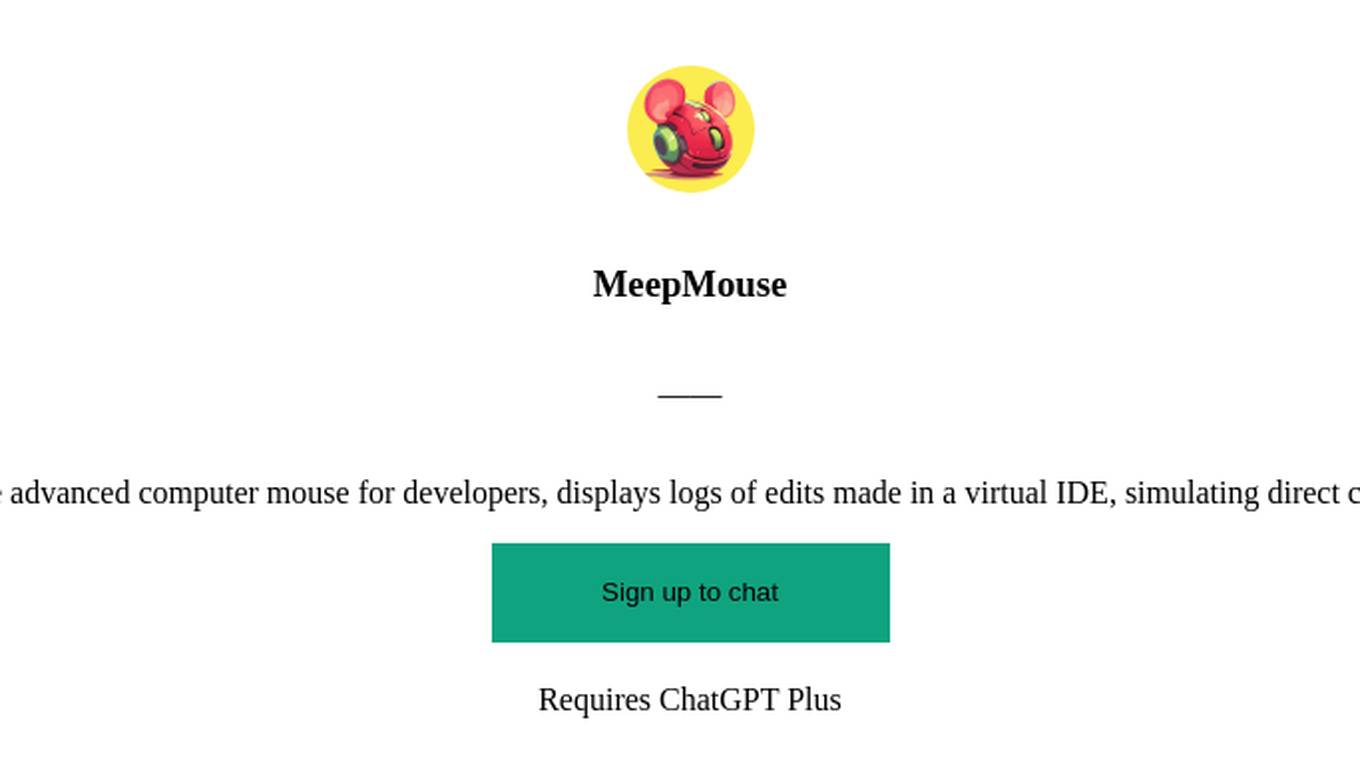
MeepMouse
MeepMouse, the advanced computer mouse for developers, displays logs of edits made in a virtual IDE, simulating direct code manipulation.

42 C C++
A coding assistant specializing in C and C++98, offering guidance and explanations.


